

Please note: reference image is displayed in place of Flash media.
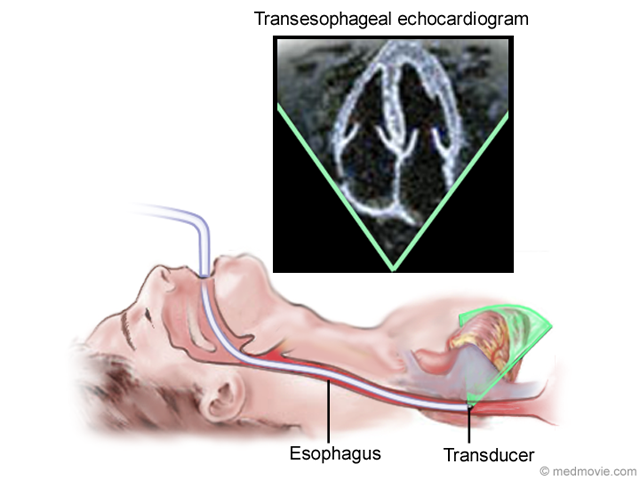
A Transesophageal Echocardiogram (also referred to as a TEE) is a diagnostic test used to view the structures of the beating heart. In this procedure, a transducer is passed through the mouth and into the esophagus, which lies behind the heart. The transducer then sends images of the heart to a monitor. TEE is commonly done in people with atrial fibrillation to see if blood clots have formed in the top chambers of the heart called the “atria”.
©2024 Medmovie.com. All rights reserved. Medmovie.com creates and licenses medical illustrations and animations for educational use. Our goal is to increase your understanding of medical terminology and help communication between patients, caregiver and healthcare professionals. The content in the Media Library is for your information and education purposes only. The Media Library is not a substitute for professional medical advice, diagnosis or treatment for specific medical conditions.
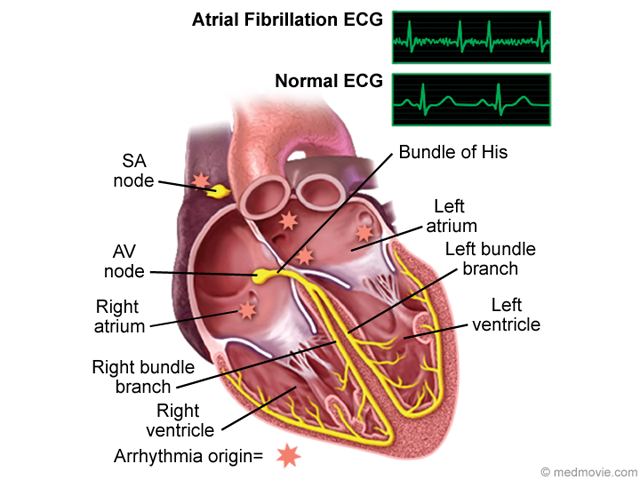 Atrial FibrillationThe heartbeat is controlled by the electrical system of the heart. This system is made up of several parts that tell…
Atrial FibrillationThe heartbeat is controlled by the electrical system of the heart. This system is made up of several parts that tell… Atrial Fibrillation AblationAtrial fibrillation is a heart arrhythmia in which abnormal electrical signals begin in the atria (top chambers) of the…
Atrial Fibrillation AblationAtrial fibrillation is a heart arrhythmia in which abnormal electrical signals begin in the atria (top chambers) of the… Atrial Fibrillation PacemakersAtrial fibrillation is a heart arrhythmia in which abnormal electrical signals begin in the atria (top chambers) of the…
Atrial Fibrillation PacemakersAtrial fibrillation is a heart arrhythmia in which abnormal electrical signals begin in the atria (top chambers) of the… Atrial Fibrillation ComplicationsAtrial fibrillation is a heart arrhythmia in which abnormal electrical signals begin in the atria (top chambers) of the…
Atrial Fibrillation ComplicationsAtrial fibrillation is a heart arrhythmia in which abnormal electrical signals begin in the atria (top chambers) of the… Atrial Fibrillation MedicationsAtrial fibrillation is a heart arrhythmia in which abnormal electrical signals begin in the atria (or top chambers) of…
Atrial Fibrillation MedicationsAtrial fibrillation is a heart arrhythmia in which abnormal electrical signals begin in the atria (or top chambers) of… Radiofrequency AblationRadiofrequency Ablation is a procedure that corrects irregular heartbeats (arrhythmias) by destroying small amounts of…
Radiofrequency AblationRadiofrequency Ablation is a procedure that corrects irregular heartbeats (arrhythmias) by destroying small amounts of… ACE InhibiorsACE Inhibitors (Angiotensin-Converting Enzyme) Inhibitors are drugs used to treat high blood pressure and heart…
ACE InhibiorsACE Inhibitors (Angiotensin-Converting Enzyme) Inhibitors are drugs used to treat high blood pressure and heart… Adams-Stokes DiseaseAdams-Stokes Disease (also known as Stokes-Adams disease) is a temporary condition that leads to fainting, or syncope.…
Adams-Stokes DiseaseAdams-Stokes Disease (also known as Stokes-Adams disease) is a temporary condition that leads to fainting, or syncope.… Aldosterone AntagonistsAldosterone Antagonists are drugs that act as diuretics (water pills), but whose main action is to block the response…
Aldosterone AntagonistsAldosterone Antagonists are drugs that act as diuretics (water pills), but whose main action is to block the response…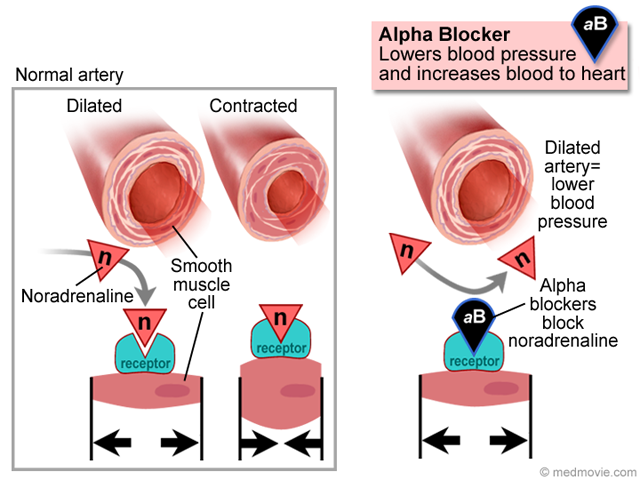 Alpha BlockersAlpha Blockers are drugs that treat a variety of conditions, such as high blood pressure, benign prostatic hypertrophy…
Alpha BlockersAlpha Blockers are drugs that treat a variety of conditions, such as high blood pressure, benign prostatic hypertrophy…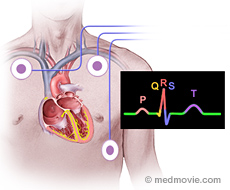 Ambulatory ElectrocardiogramAn Electrocardiogram (ECG or EKG) is a quick, painless test that records the electrical activity of the heart. It may…
Ambulatory ElectrocardiogramAn Electrocardiogram (ECG or EKG) is a quick, painless test that records the electrical activity of the heart. It may… Angina/ Unstable AnginaAngina is a pain or discomfort in your chest caused by plaque that narrows or blocks the coronary arteries and reduces…
Angina/ Unstable AnginaAngina is a pain or discomfort in your chest caused by plaque that narrows or blocks the coronary arteries and reduces… Angina TreatmentsAngina Treatments include drugs and procedures that are used to relieve the chest pain or discomfort associated with…
Angina TreatmentsAngina Treatments include drugs and procedures that are used to relieve the chest pain or discomfort associated with…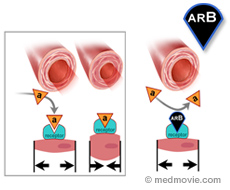 ARBsAngiotensin II Receptor Blockers (ARBs) are drugs most often prescribed for people who experience side effects with ACE…
ARBsAngiotensin II Receptor Blockers (ARBs) are drugs most often prescribed for people who experience side effects with ACE… Ankle Brachial IndexThe Ankle-Brachial Index (ABI) test is a painless exam that compares the blood pressure in your feet to the blood…
Ankle Brachial IndexThe Ankle-Brachial Index (ABI) test is a painless exam that compares the blood pressure in your feet to the blood…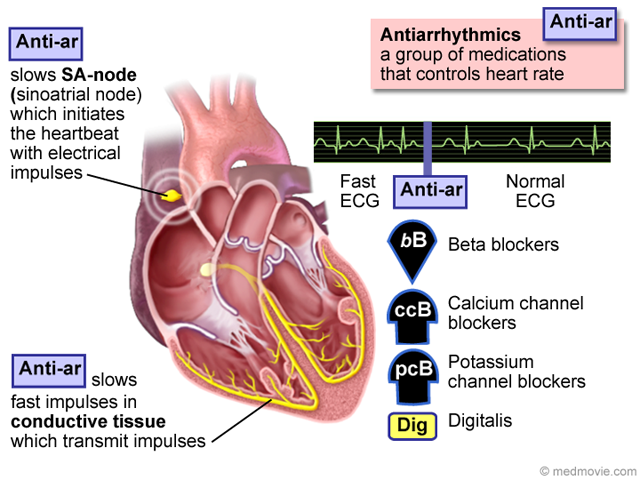 AntiarrhythmicsAntiarrhythmics are drugs that help control the heart rate and rhythm. They do this by either suppressing the activity…
AntiarrhythmicsAntiarrhythmics are drugs that help control the heart rate and rhythm. They do this by either suppressing the activity…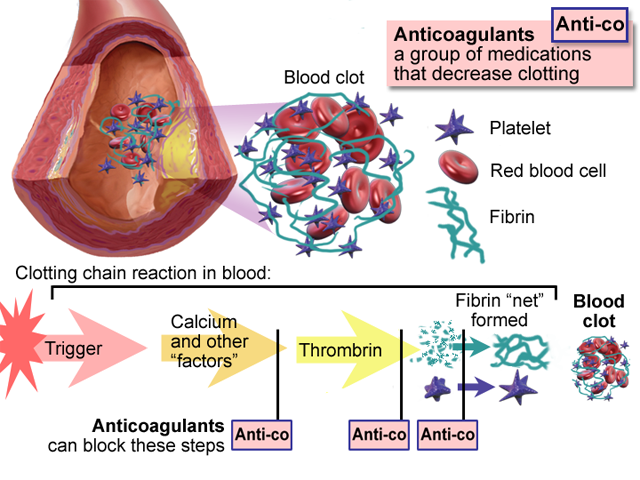 AnticoagulantsAnticoagulants decrease the ability of the blood to clot (coagulate). They are sometimes called blood thinners,…
AnticoagulantsAnticoagulants decrease the ability of the blood to clot (coagulate). They are sometimes called blood thinners,… AntihypertensivesAntihypertensives are drugs commonly prescribed to help lower blood pressure when appropriate diet and regular physical…
AntihypertensivesAntihypertensives are drugs commonly prescribed to help lower blood pressure when appropriate diet and regular physical… Aortic Aneurysm TypesAn Aortic Aneurysm is an abnormal enlargement (bulging) of part of the wall of the aorta. It is most commonly a result…
Aortic Aneurysm TypesAn Aortic Aneurysm is an abnormal enlargement (bulging) of part of the wall of the aorta. It is most commonly a result…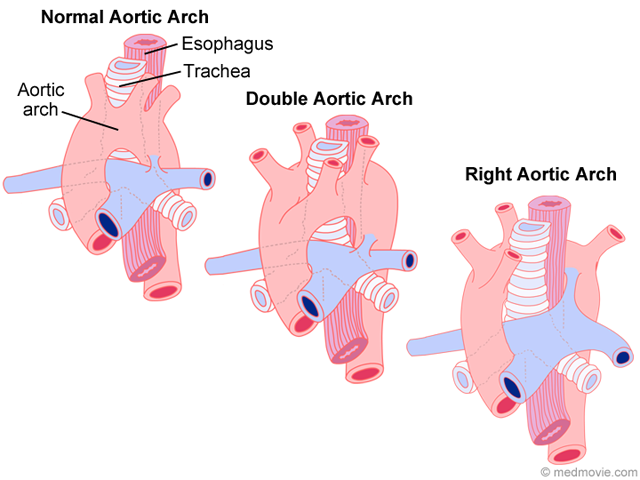 Aortic Arch Developmental DefectsDuring normal aortic arch development, a double arch forms, merging behind the heart to become a single dorsal aorta.…
Aortic Arch Developmental DefectsDuring normal aortic arch development, a double arch forms, merging behind the heart to become a single dorsal aorta.…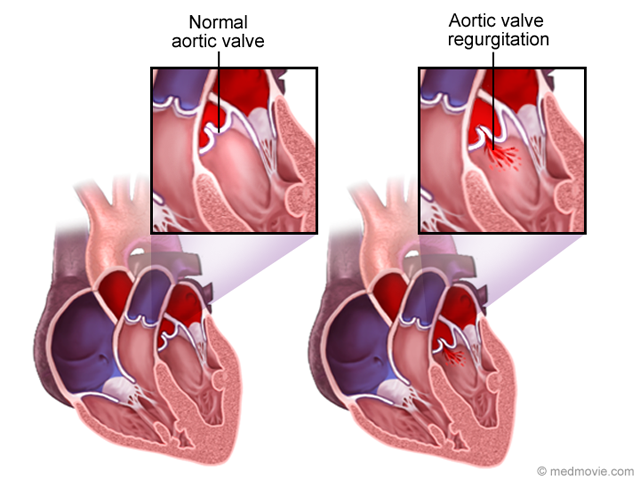 Aortic Valve RegurgitationAortic Valve Regurgitation is an abnormality of the aortic valve that allows blood to flow backwards through the valve.…
Aortic Valve RegurgitationAortic Valve Regurgitation is an abnormality of the aortic valve that allows blood to flow backwards through the valve.…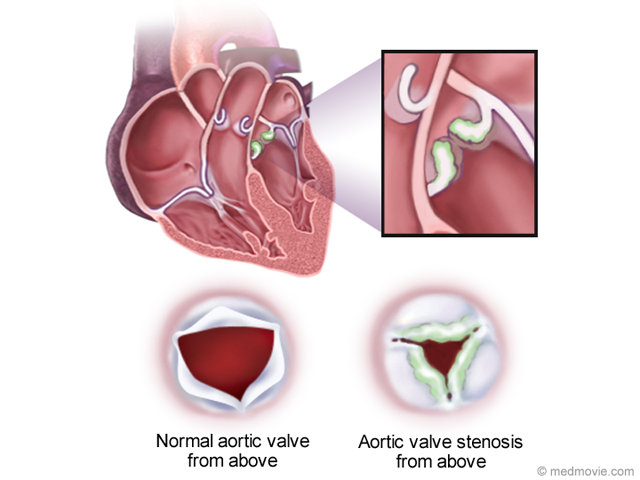 Aortic Valve StenosisThe aortic valve is between your heart’s main pumping chamber (left ventricle) and the major artery (aorta) that…
Aortic Valve StenosisThe aortic valve is between your heart’s main pumping chamber (left ventricle) and the major artery (aorta) that… Aortic Valvular StenosisAortic valve stenosis is a condition in which the aortic valve is deformed and narrowed. The narrowing or stenosis is…
Aortic Valvular StenosisAortic valve stenosis is a condition in which the aortic valve is deformed and narrowed. The narrowing or stenosis is…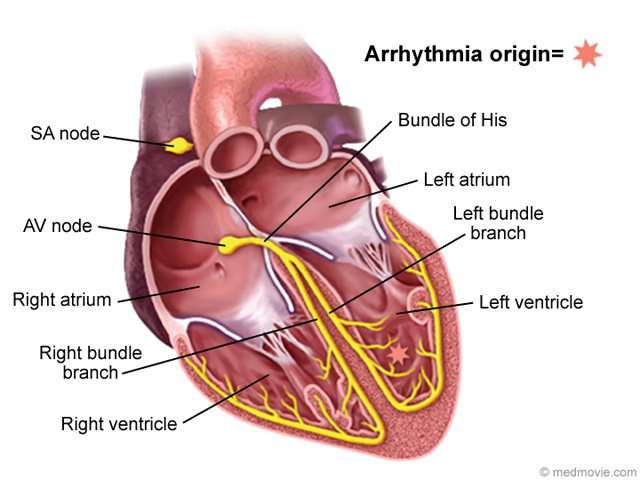 ArrhythmiasAn Arrhythmia is a heartbeat that’s too fast, too slow or irregular (uneven). Arrhythmias are caused by problems with…
ArrhythmiasAn Arrhythmia is a heartbeat that’s too fast, too slow or irregular (uneven). Arrhythmias are caused by problems with…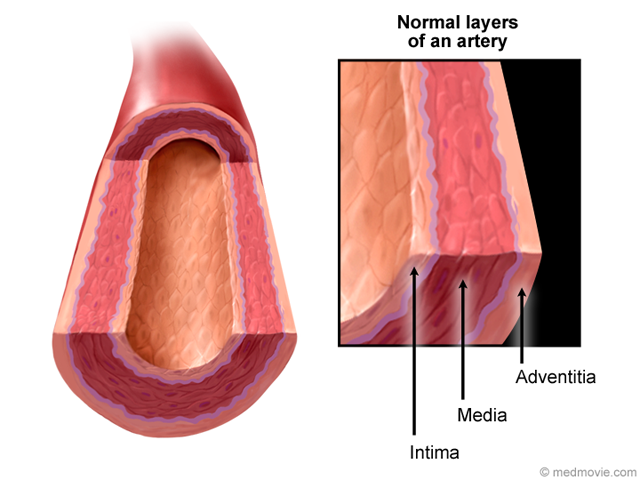 Arterial AnatomyArterial Anatomy includes the layers that make up the walls of the artery. An artery has three layers. The outer layer…
Arterial AnatomyArterial Anatomy includes the layers that make up the walls of the artery. An artery has three layers. The outer layer… Arterial GraftsSections of arteries in the body can be used as Arterial Grafts to reroute blood around arterial blockage that cut off…
Arterial GraftsSections of arteries in the body can be used as Arterial Grafts to reroute blood around arterial blockage that cut off… AspirinAspirin has been shown to help prevent heart attack and stroke. The American Heart Association recommends aspirin use…
AspirinAspirin has been shown to help prevent heart attack and stroke. The American Heart Association recommends aspirin use… AtherosclerosisAtherosclerosis is a disease affecting blood vessels called arteries. Fatty material called plaque builds up within the…
AtherosclerosisAtherosclerosis is a disease affecting blood vessels called arteries. Fatty material called plaque builds up within the…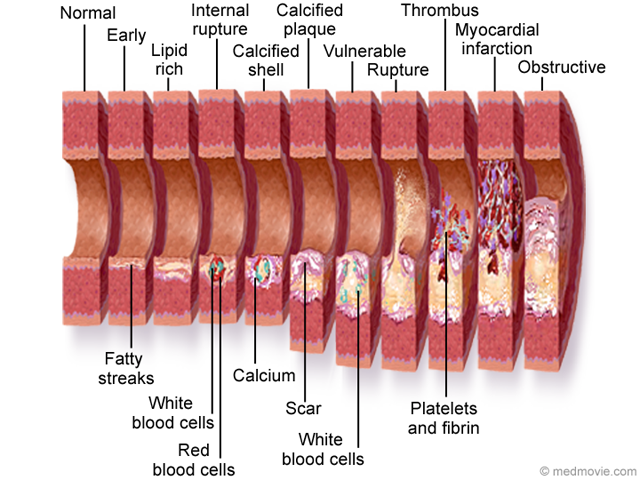 Atherosclerosis CalcificationAtherosclerosis is a disease where fatty material called plaque builds up in the inner lining of arteries and makes…
Atherosclerosis CalcificationAtherosclerosis is a disease where fatty material called plaque builds up in the inner lining of arteries and makes…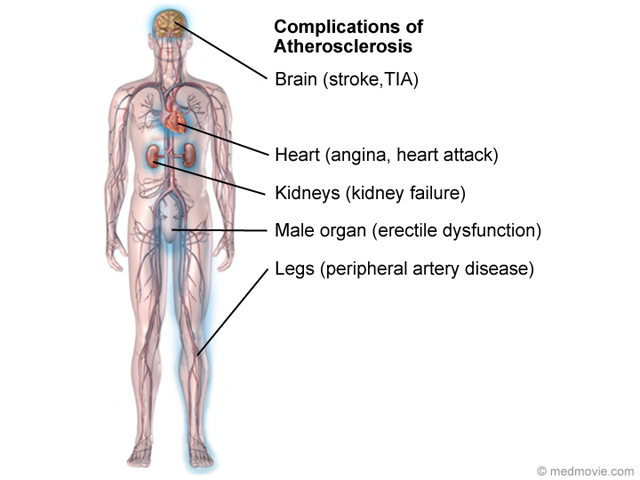 Atherosclerosis ComplicationsAtherosclerosis is a disease where fatty material called plaque builds up in the inner lining of arteries and makes…
Atherosclerosis ComplicationsAtherosclerosis is a disease where fatty material called plaque builds up in the inner lining of arteries and makes… Atrial FibrillationThe heartbeat is controlled by the electrical system of the heart. This system is made up of several parts that tell…
Atrial FibrillationThe heartbeat is controlled by the electrical system of the heart. This system is made up of several parts that tell… Atrial Fibrillation AblationAtrial fibrillation is a heart arrhythmia in which abnormal electrical signals begin in the atria (top chambers) of the…
Atrial Fibrillation AblationAtrial fibrillation is a heart arrhythmia in which abnormal electrical signals begin in the atria (top chambers) of the… Atrial Fibrillation PacemakersAtrial fibrillation is a heart arrhythmia in which abnormal electrical signals begin in the atria (top chambers) of the…
Atrial Fibrillation PacemakersAtrial fibrillation is a heart arrhythmia in which abnormal electrical signals begin in the atria (top chambers) of the… Atrial Fibrillation ComplicationsAtrial fibrillation is a heart arrhythmia in which abnormal electrical signals begin in the atria (top chambers) of the…
Atrial Fibrillation ComplicationsAtrial fibrillation is a heart arrhythmia in which abnormal electrical signals begin in the atria (top chambers) of the… Atrial Fibrillation MedicationsAtrial fibrillation is a heart arrhythmia in which abnormal electrical signals begin in the atria (or top chambers) of…
Atrial Fibrillation MedicationsAtrial fibrillation is a heart arrhythmia in which abnormal electrical signals begin in the atria (or top chambers) of…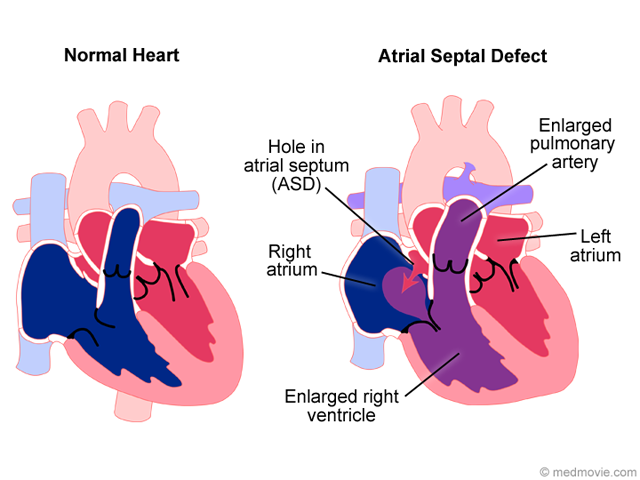 Atrial Septal DefectAtrial septal defect (ASD) is an abnormal opening in the septum, or wall, that separates the right and left atria. It…
Atrial Septal DefectAtrial septal defect (ASD) is an abnormal opening in the septum, or wall, that separates the right and left atria. It…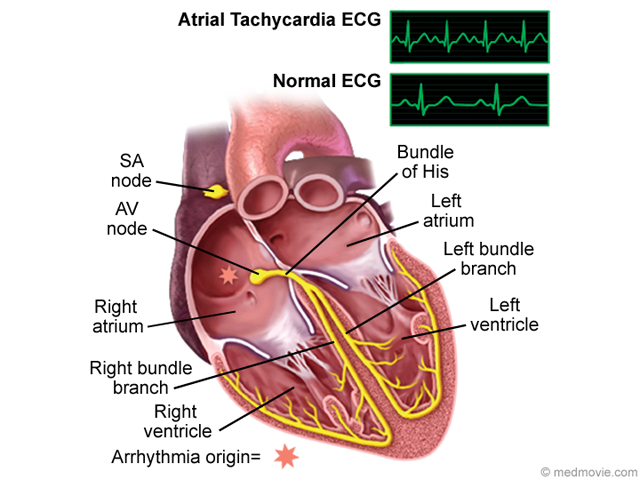 Atrial TachycardiaAtrial Tachycardia is an abnormal heartbeat that is caused by an abnormal firing of electrical signals in the atria of…
Atrial TachycardiaAtrial Tachycardia is an abnormal heartbeat that is caused by an abnormal firing of electrical signals in the atria of… AV CanalAV canal, or atrioventricular canal, is a condition characterized by a group of related abnormalities of the heart.…
AV CanalAV canal, or atrioventricular canal, is a condition characterized by a group of related abnormalities of the heart.… Bacterial EndocarditisBacterial Endocarditis is an infection of the inner lining (endocardium) of the heart’s chambers or valves. It is…
Bacterial EndocarditisBacterial Endocarditis is an infection of the inner lining (endocardium) of the heart’s chambers or valves. It is… Beta BlockersBeta Blockers are drugs that slow the heart rate, decrease cardiac output, lessen the force with which the heart muscle…
Beta BlockersBeta Blockers are drugs that slow the heart rate, decrease cardiac output, lessen the force with which the heart muscle… Blood ClotBlood Clots are jelly-like masses of blood tissue formed by clotting (coagulating) factors in the blood. A blood clot…
Blood ClotBlood Clots are jelly-like masses of blood tissue formed by clotting (coagulating) factors in the blood. A blood clot…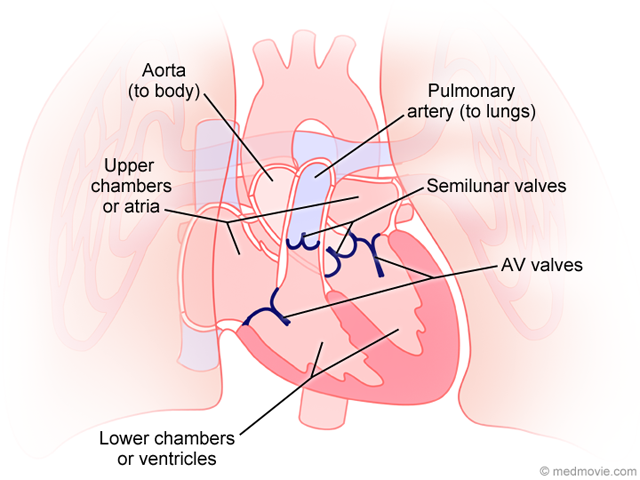 Blood FlowBlood Flow occurs simultaneously through both the right and left side of the heart in a specific pattern. First…
Blood FlowBlood Flow occurs simultaneously through both the right and left side of the heart in a specific pattern. First…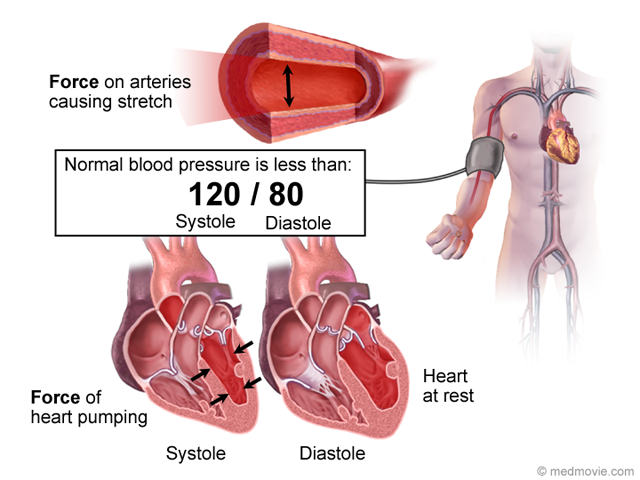 Blood PressureBlood Pressure is the pressure of the blood exerted against the walls of the arteries. Optimal blood pressure is less…
Blood PressureBlood Pressure is the pressure of the blood exerted against the walls of the arteries. Optimal blood pressure is less…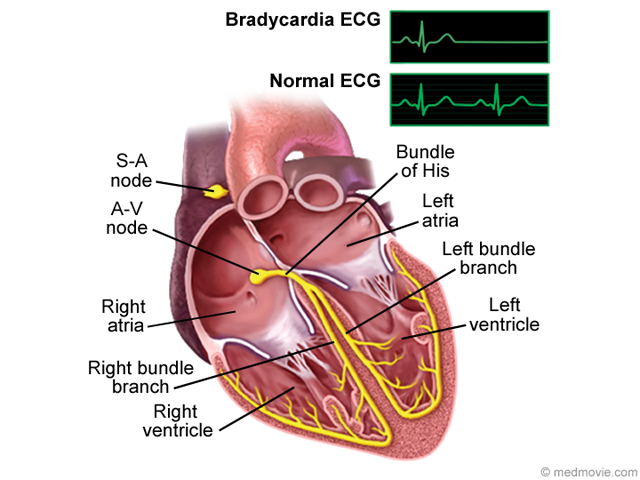 BradycardiaBradycardia is a condition in which the heart beats too slowly (less than 60 beats per minute). It may be caused by a…
BradycardiaBradycardia is a condition in which the heart beats too slowly (less than 60 beats per minute). It may be caused by a…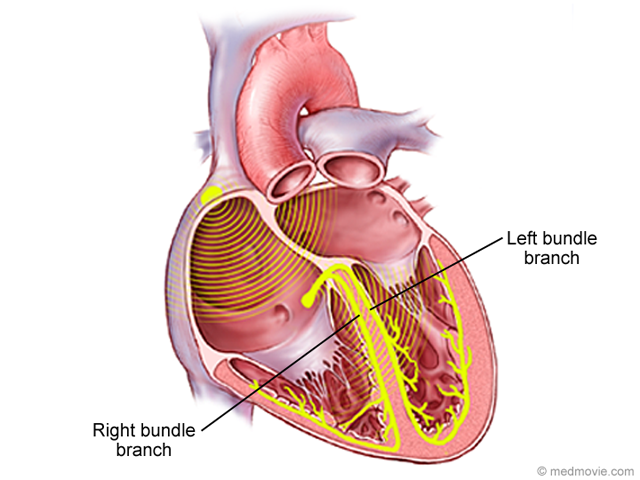 Bundle BranchesThe electrical system of the heart is made up of several parts that communicate with one another to signal the heart…
Bundle BranchesThe electrical system of the heart is made up of several parts that communicate with one another to signal the heart…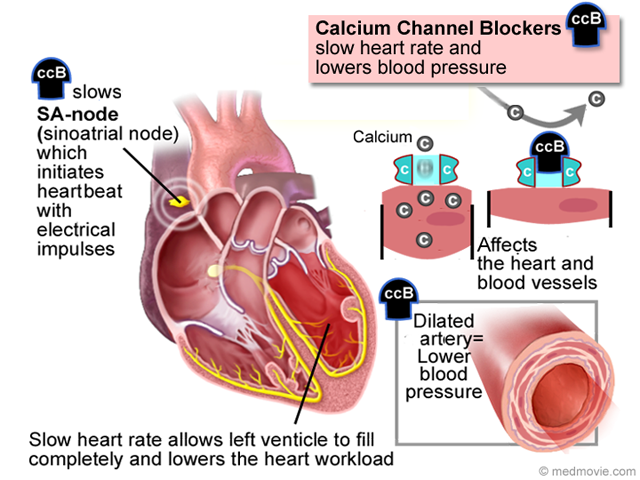 Calcium Channel BlockersCalcium Channel Blockers are drugs that block the movement of calcium into heart and blood vessel muscle cells, which…
Calcium Channel BlockersCalcium Channel Blockers are drugs that block the movement of calcium into heart and blood vessel muscle cells, which… CapillariesCapillaries are part of the circulatory system. They are tiny vessels that connect the smallest arteries and veins.…
CapillariesCapillaries are part of the circulatory system. They are tiny vessels that connect the smallest arteries and veins.…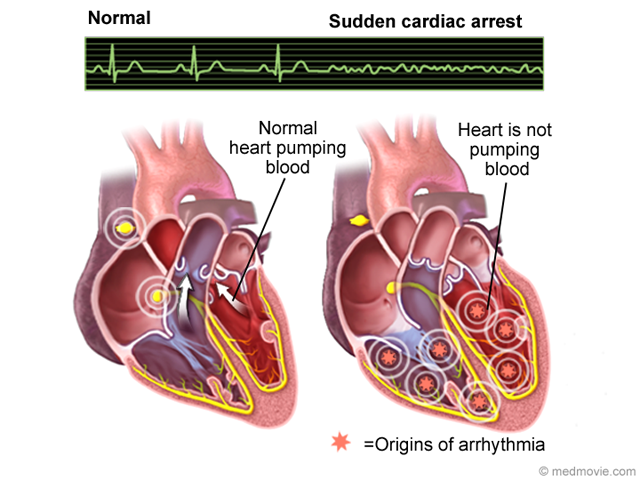 Cardiac ArrestCardiac Arrest is the sudden, abrupt loss of heart function. It's also called sudden cardiac arrest or unexpected…
Cardiac ArrestCardiac Arrest is the sudden, abrupt loss of heart function. It's also called sudden cardiac arrest or unexpected… Cardiac CatheterizationCardiac Catheterization (cardiac cath) is a procedure that helps doctors see how well your heart is working. Doctors…
Cardiac CatheterizationCardiac Catheterization (cardiac cath) is a procedure that helps doctors see how well your heart is working. Doctors… Carotid AngiographyA Carotid Angiography is a test that uses X-rays to show narrowing or blockage in your carotid arteries in your neck…
Carotid AngiographyA Carotid Angiography is a test that uses X-rays to show narrowing or blockage in your carotid arteries in your neck…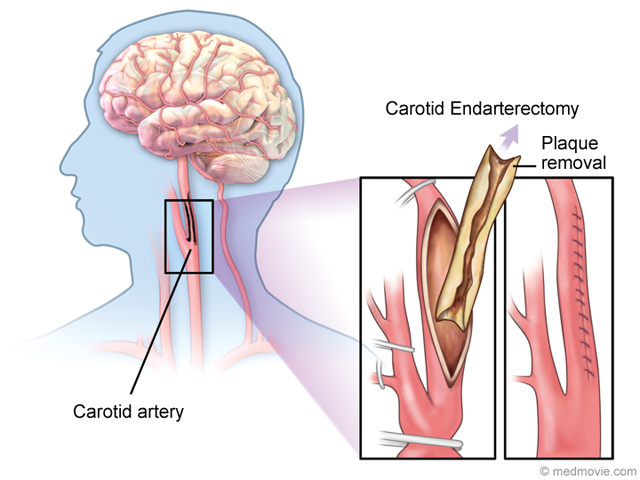 Carotid Artery SurgeryCarotid Artery Surgery, also known as carotid endarterectomy, is a procedure that removes fatty deposits (plaque) that…
Carotid Artery SurgeryCarotid Artery Surgery, also known as carotid endarterectomy, is a procedure that removes fatty deposits (plaque) that…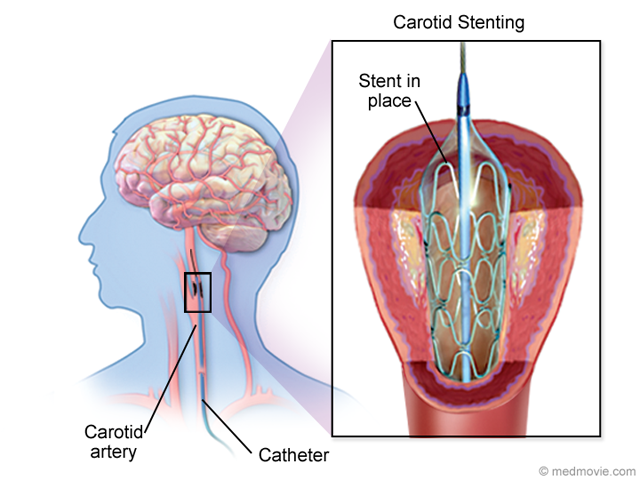 Carotid StentingThe carotid artery is a major artery in the neck that carries blood to the brain. Carotid angioplasty is used to open…
Carotid StentingThe carotid artery is a major artery in the neck that carries blood to the brain. Carotid angioplasty is used to open… Catheter AblationCatheter Ablation is a procedure that corrects irregular heartbeats by destroying small amounts of tissue that cause…
Catheter AblationCatheter Ablation is a procedure that corrects irregular heartbeats by destroying small amounts of tissue that cause… Cholesterol - HDL and LDLCholesterol is a soft, waxy substance found among the lipids (fats) in the bloodstream and in all your body's cells.…
Cholesterol - HDL and LDLCholesterol is a soft, waxy substance found among the lipids (fats) in the bloodstream and in all your body's cells.… Cholesterol Lowering DrugsCholesterol-Lowering Drugs may help reduce the bad cholesterol (LDL), increase the good cholesterol (HDL) and reduce…
Cholesterol Lowering DrugsCholesterol-Lowering Drugs may help reduce the bad cholesterol (LDL), increase the good cholesterol (HDL) and reduce… Cholesterol SourcesThe liver produces about 1,000 mg of cholesterol a day. Another 200 to 500 mg can come from food.
Cholesterol SourcesThe liver produces about 1,000 mg of cholesterol a day. Another 200 to 500 mg can come from food.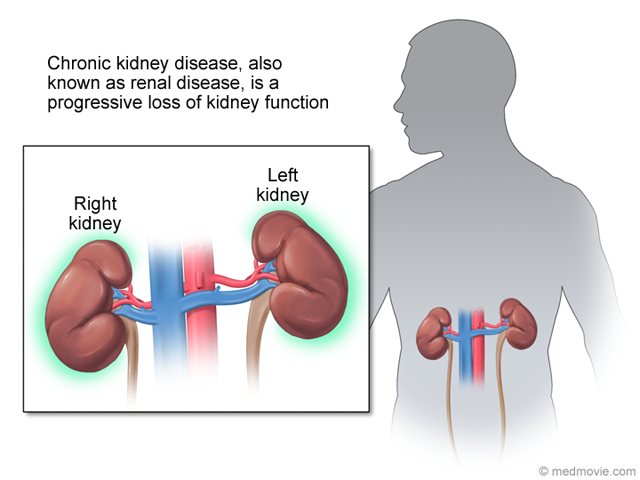 Chronic Kidney DiseaseChronic kidney disease, also known as renal disease, is progressive loss of kidney function.
Stages of kidney…
Chronic Kidney DiseaseChronic kidney disease, also known as renal disease, is progressive loss of kidney function.
Stages of kidney… Classification of Cardiovascular DiseaseClassification of Functional Capacity and Objective Assessment is an in-patient screening criteria for cardiac disease,…
Classification of Cardiovascular DiseaseClassification of Functional Capacity and Objective Assessment is an in-patient screening criteria for cardiac disease,…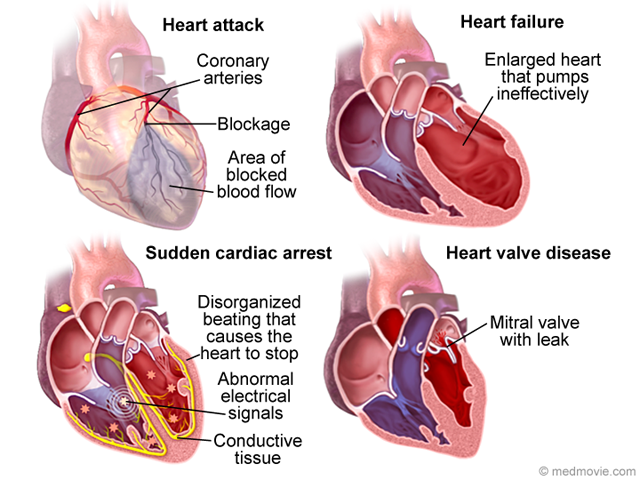 Common Heart ProblemsSudden cardiac arrest, heart attack, heart failure, heart valve disease- these are all terms that are common to…
Common Heart ProblemsSudden cardiac arrest, heart attack, heart failure, heart valve disease- these are all terms that are common to… Common Vascular ProblemsThe vascular (circulatory) system is made up of blood vessels called arteries and veins. Arteries carry oxygenated…
Common Vascular ProblemsThe vascular (circulatory) system is made up of blood vessels called arteries and veins. Arteries carry oxygenated… Communicating with your ProviderThe American Heart Association encourages you to actively discuss all aspects of your health. Talking with your…
Communicating with your ProviderThe American Heart Association encourages you to actively discuss all aspects of your health. Talking with your…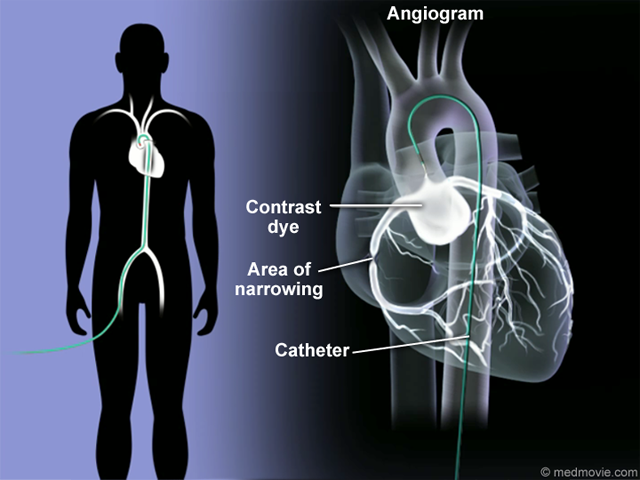 Coronary AngiogramA Coronary Angiogram is a test that uses X-rays to help your doctor find narrowing or blockage in one or more of your…
Coronary AngiogramA Coronary Angiogram is a test that uses X-rays to help your doctor find narrowing or blockage in one or more of your… Coronary AngioplastyCoronary Angioplasty (also called percutaneous coronary intervention or PCI) is a procedure that opens up narrowed or…
Coronary AngioplastyCoronary Angioplasty (also called percutaneous coronary intervention or PCI) is a procedure that opens up narrowed or… Coronary ArteriesThe coronary arteries are the blood vessels that supply blood to the heart muscle. They branch off of the aorta at its…
Coronary ArteriesThe coronary arteries are the blood vessels that supply blood to the heart muscle. They branch off of the aorta at its… Coronary ArteriographyCoronary Arteriography is a test that uses X-rays to help your doctor find narrowing or blockage in one or more of your…
Coronary ArteriographyCoronary Arteriography is a test that uses X-rays to help your doctor find narrowing or blockage in one or more of your… Coronary Artery Bypass Coronary Artery Bypass Graft Surgery (CABG) creates new pathways around narrowed or blocked coronary arteries so that…
Coronary Artery Bypass Coronary Artery Bypass Graft Surgery (CABG) creates new pathways around narrowed or blocked coronary arteries so that… Coronary Artery DiseaseCoronary Artery Disease occurs when the arteries that supply blood to your heart become narrowed or blocked by fatty…
Coronary Artery DiseaseCoronary Artery Disease occurs when the arteries that supply blood to your heart become narrowed or blocked by fatty… Coronary Artery SpasmA Coronary Artery Spasm is a sudden, temporary contraction of muscle fibers within the walls of the coronary artery. It…
Coronary Artery SpasmA Coronary Artery Spasm is a sudden, temporary contraction of muscle fibers within the walls of the coronary artery. It…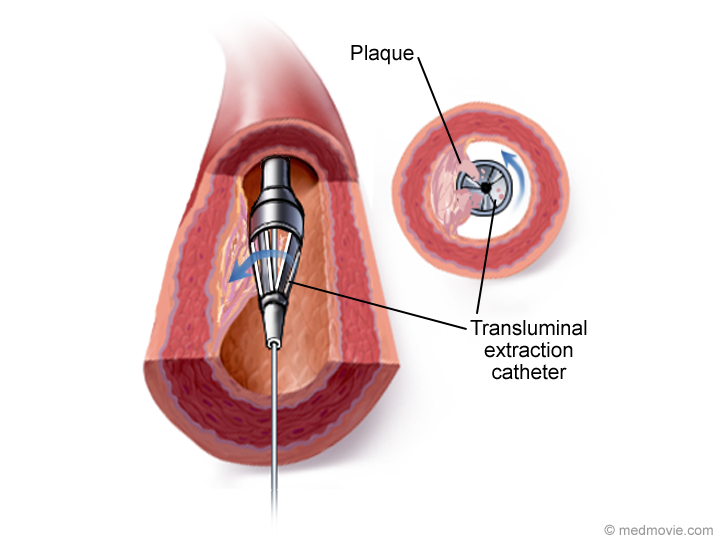 Coronary AtherectomyCoronary Atherectomy is a procedure that removes fatty material (plaque) from your coronary arteries so more blood can…
Coronary AtherectomyCoronary Atherectomy is a procedure that removes fatty material (plaque) from your coronary arteries so more blood can…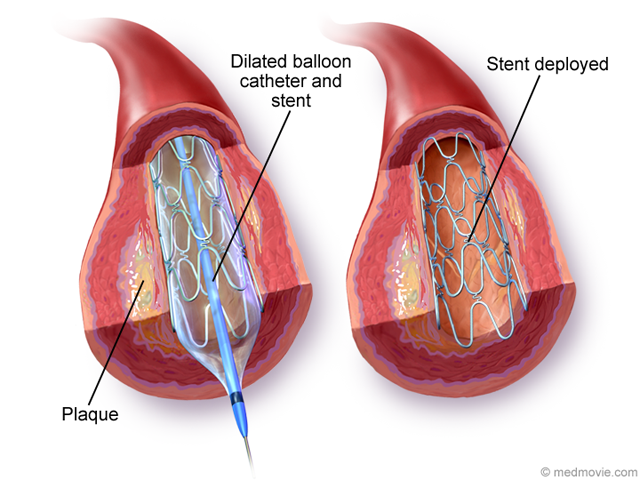 Coronary StentA Coronary Stent is a small wire mesh tube that is used to help keep coronary (heart) arteries open after angioplasty.…
Coronary StentA Coronary Stent is a small wire mesh tube that is used to help keep coronary (heart) arteries open after angioplasty.…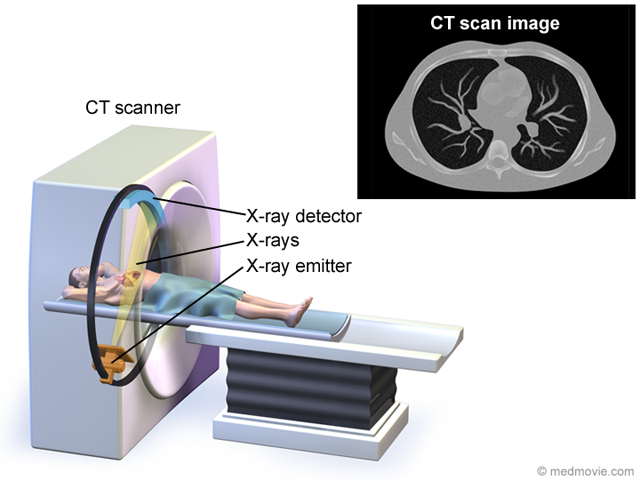 CT ScanA CT scan is a diagnostic test that uses X-rays to allow images of the body to be made. CT stands for “Computed…
CT ScanA CT scan is a diagnostic test that uses X-rays to allow images of the body to be made. CT stands for “Computed… Diabetes ComplicationsDiabetes is a disease that affects the way your body makes and uses insulin. Either your body doesn’t make enough…
Diabetes ComplicationsDiabetes is a disease that affects the way your body makes and uses insulin. Either your body doesn’t make enough…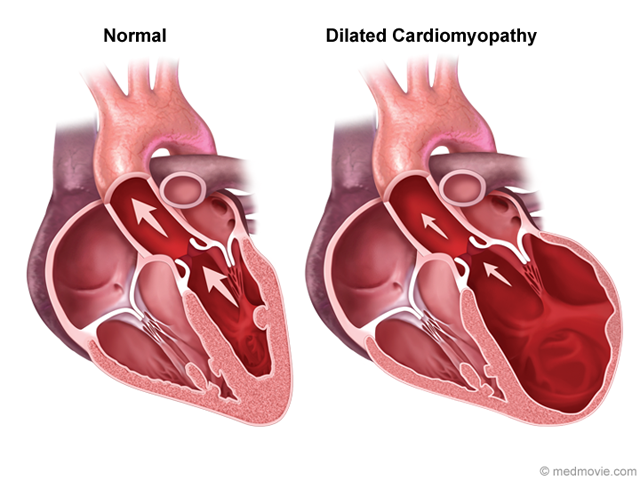 Dilated CardiomyopathyDilated Cardiomyopathy is a disease in which one or more of the heart’s chambers become enlarged (dilated). In this…
Dilated CardiomyopathyDilated Cardiomyopathy is a disease in which one or more of the heart’s chambers become enlarged (dilated). In this…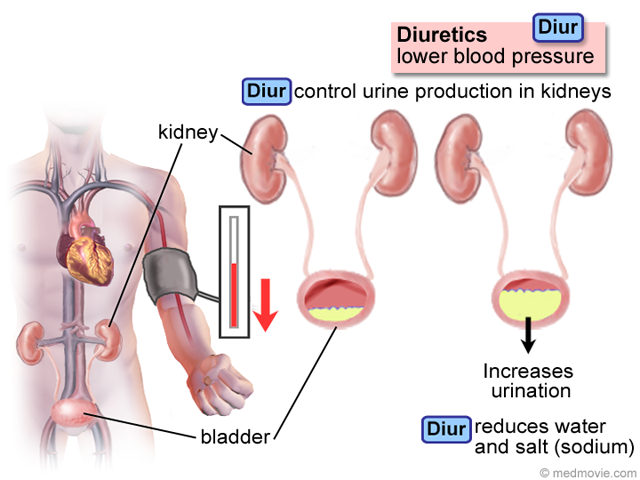 DiureticsDiuretics (often called water pills) are drugs that cause the body to rid itself of excess fluids and sodium through…
DiureticsDiuretics (often called water pills) are drugs that cause the body to rid itself of excess fluids and sodium through… Doppler UltrasoundDoppler Ultrasound is a test that uses high-frequency sound waves to detect the speed and direction of blood flow in…
Doppler UltrasoundDoppler Ultrasound is a test that uses high-frequency sound waves to detect the speed and direction of blood flow in…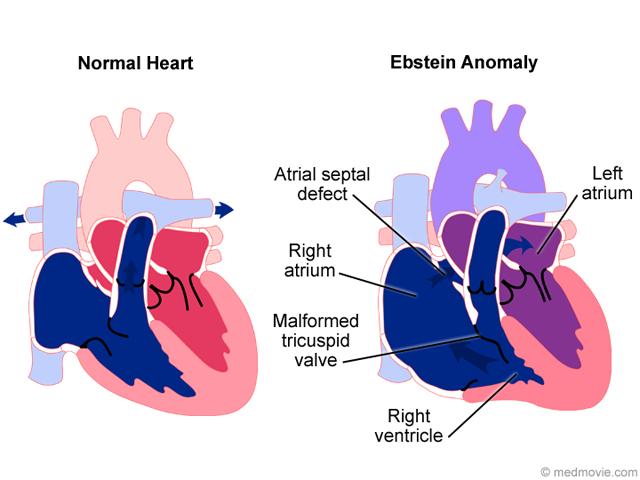 Ebstein AnomalyEbstein anomaly is characterized by a severely malformed and displaced tricuspid valve. This results in regurgitation,…
Ebstein AnomalyEbstein anomaly is characterized by a severely malformed and displaced tricuspid valve. This results in regurgitation,…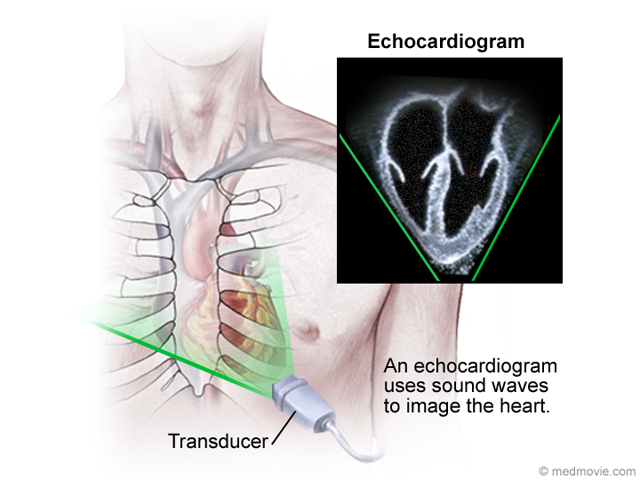 EchocardiogramAn Echocardiogram is a procedure that sends ultrasound waves (like sonar) into the chest to create moving pictures of…
EchocardiogramAn Echocardiogram is a procedure that sends ultrasound waves (like sonar) into the chest to create moving pictures of…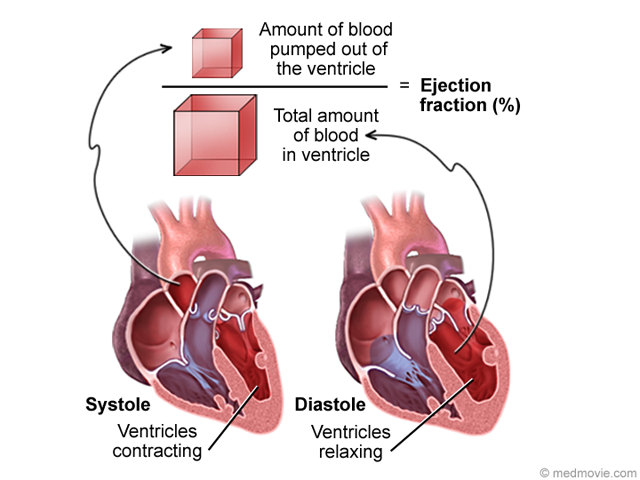 Ejection FractionDuring each heartbeat, the heart contracts and relaxes. The ventricles are the pumping chambers of the heart. In…
Ejection FractionDuring each heartbeat, the heart contracts and relaxes. The ventricles are the pumping chambers of the heart. In… Electrical SystemThe purpose of the Electrical System of the heart is to coordinate the pumping of the four chambers of the heart and to…
Electrical SystemThe purpose of the Electrical System of the heart is to coordinate the pumping of the four chambers of the heart and to…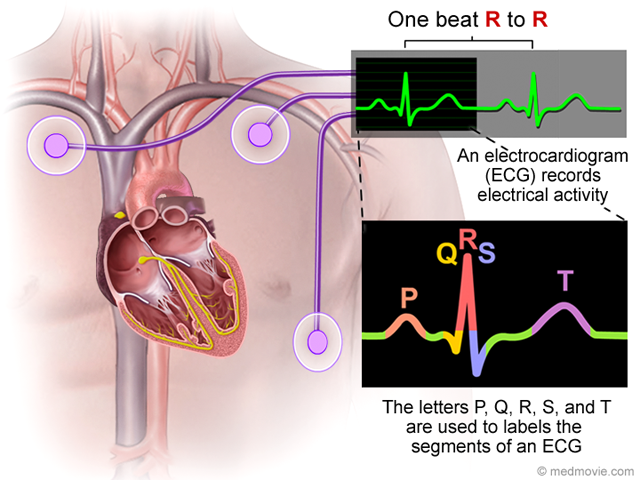 ElectrocardiogramAn Electrocardiogram (ECG or EKG) is a quick, painless test that records the electrical activity of the heart. It may…
ElectrocardiogramAn Electrocardiogram (ECG or EKG) is a quick, painless test that records the electrical activity of the heart. It may… Electrophysiology StudyAn Electrophysiology Study is performed to evaluate the electrical activity of the heart. Three to five electrically…
Electrophysiology StudyAn Electrophysiology Study is performed to evaluate the electrical activity of the heart. Three to five electrically…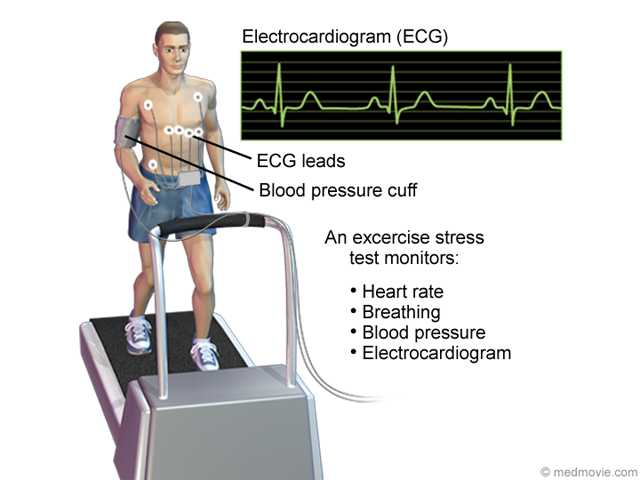 Exercise Stress TestExercise Stress Test is a diagnostic test in which a person walks on a treadmill or pedals a stationary bicycle while…
Exercise Stress TestExercise Stress Test is a diagnostic test in which a person walks on a treadmill or pedals a stationary bicycle while… External DefibrillatorAn External Defibrillator is a machine that is used to deliver an electrical shock to the heart to restore a normal…
External DefibrillatorAn External Defibrillator is a machine that is used to deliver an electrical shock to the heart to restore a normal… Healthy EatingHealthy eating decreases the risk of heart disease and is good for the entire cardiovascular system. There are three…
Healthy EatingHealthy eating decreases the risk of heart disease and is good for the entire cardiovascular system. There are three…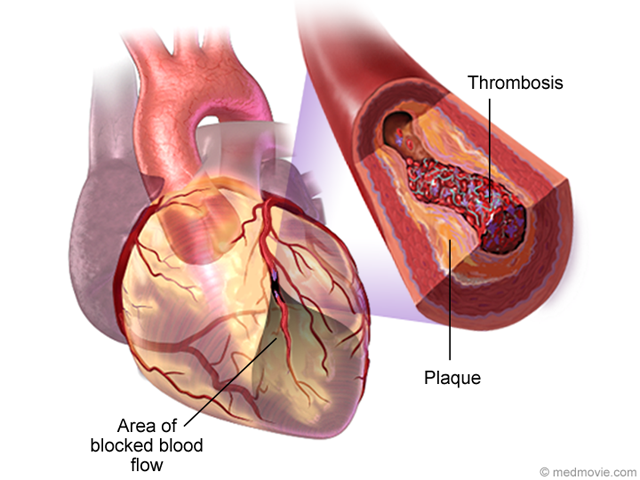 Heart AttackA Heart Attack occurs when the blood supply to part of the heart muscle, or myocardioum, is severely reduced or…
Heart AttackA Heart Attack occurs when the blood supply to part of the heart muscle, or myocardioum, is severely reduced or…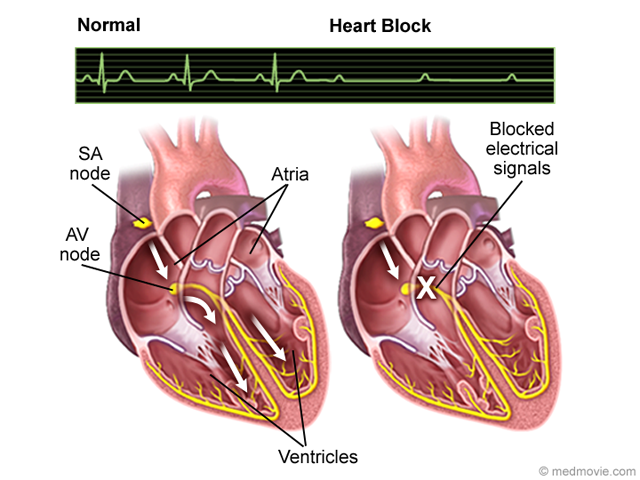 Heart BlockThe heart's "natural" pacemaker is called the sinoatrial (SA) node or sinus node and is located in the right atrium. It…
Heart BlockThe heart's "natural" pacemaker is called the sinoatrial (SA) node or sinus node and is located in the right atrium. It…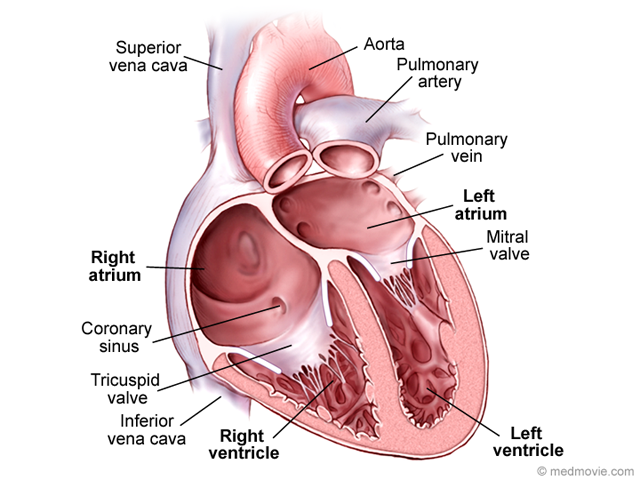 Heart ChambersThe heart has two sides (a right and a left) and is comprised of four Heart Chambers. The two atria (right and left)…
Heart ChambersThe heart has two sides (a right and a left) and is comprised of four Heart Chambers. The two atria (right and left)…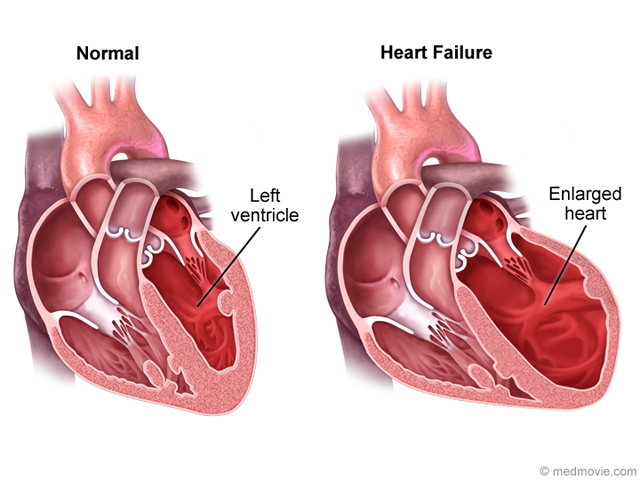 Heart FailureHeart Failure is a chronic condition in which the heart muscle gets progressively weaker and is unable to pump…
Heart FailureHeart Failure is a chronic condition in which the heart muscle gets progressively weaker and is unable to pump… Heart TransplantA Heart Transplant is a surgical procedure that replaces a failing heart with a healthy donor heart. Physicians make a…
Heart TransplantA Heart Transplant is a surgical procedure that replaces a failing heart with a healthy donor heart. Physicians make a… Heart Valve DiseaseHeart Valve Disease is any condition that disrupts the proper function of the valve. There are four valves in the heart…
Heart Valve DiseaseHeart Valve Disease is any condition that disrupts the proper function of the valve. There are four valves in the heart…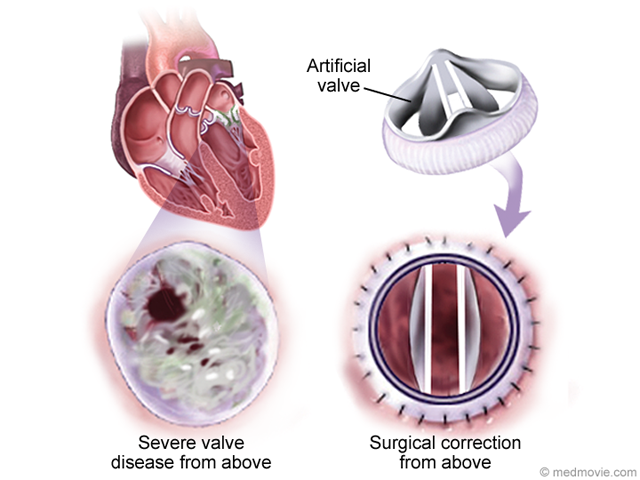 Heart Valve SurgeryHeart Valve Surgery replaces an abnormal or diseased heart valve with a healthy one. The replacement valve can be…
Heart Valve SurgeryHeart Valve Surgery replaces an abnormal or diseased heart valve with a healthy one. The replacement valve can be… Hemorrhagic StrokeThere are two types of hemorrhagic strokes: those caused by an intracerebral hemorrhage (ICH) and those caused by a…
Hemorrhagic StrokeThere are two types of hemorrhagic strokes: those caused by an intracerebral hemorrhage (ICH) and those caused by a…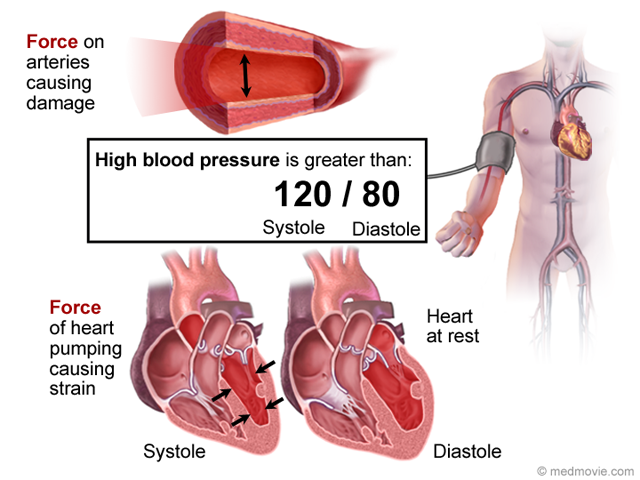 High Blood PressureBlood pressure is the pressure of the blood against the walls of the arteries. Optimal blood pressure is less than 120…
High Blood PressureBlood pressure is the pressure of the blood against the walls of the arteries. Optimal blood pressure is less than 120… High Blood Pressure ComplicationsBlood pressure is the pressure of the blood exerted against the walls of the arteries. Optimal blood pressure is less…
High Blood Pressure ComplicationsBlood pressure is the pressure of the blood exerted against the walls of the arteries. Optimal blood pressure is less…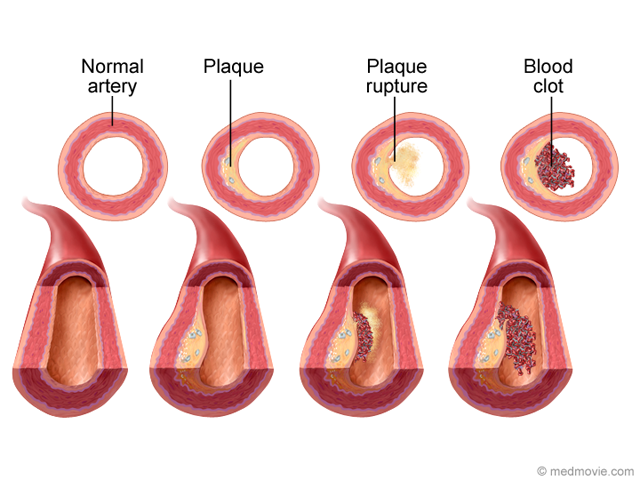 High CholesterolCholesterol is found in the blood and every cell in your body. Your body needs cholesterol to work properly. But, High…
High CholesterolCholesterol is found in the blood and every cell in your body. Your body needs cholesterol to work properly. But, High… His Bundle ElectrographyHis Bundle Electrography is a test that measures electrical activity in a part of the heart known as the bundle of His.…
His Bundle ElectrographyHis Bundle Electrography is a test that measures electrical activity in a part of the heart known as the bundle of His.… Holter MonitorA Holter Monitor is a battery-operated, portable device that measures and tape-records your heart’s electrical activity…
Holter MonitorA Holter Monitor is a battery-operated, portable device that measures and tape-records your heart’s electrical activity…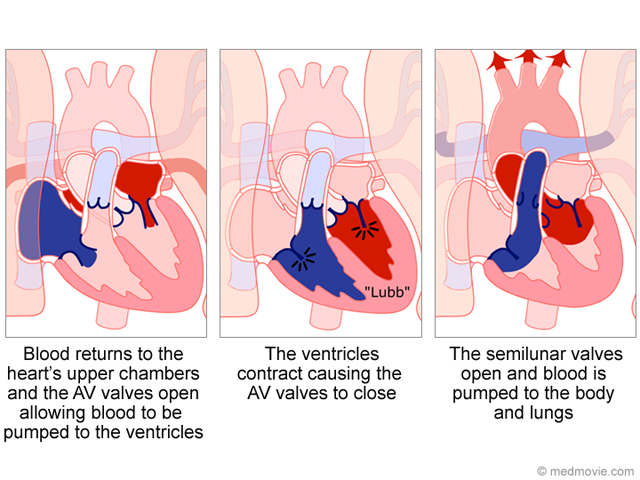 How the Valves WorkThe heart has four Valves that allow blood to flow through the heart in one direction only. The mitral valve and the…
How the Valves WorkThe heart has four Valves that allow blood to flow through the heart in one direction only. The mitral valve and the… Hypertrophic CardiomyopathyHypertrophic Cardiomyopathy is a condition in which the muscular walls of the left ventricle become abnormally thick.…
Hypertrophic CardiomyopathyHypertrophic Cardiomyopathy is a condition in which the muscular walls of the left ventricle become abnormally thick.…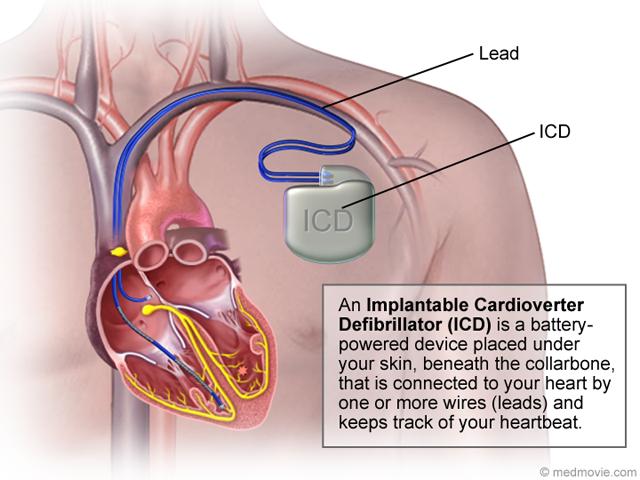 ICD DeviceAn Implantable Cardioverter Defibrillator (ICD) is a battery-powered device placed under your skin, beneath the…
ICD DeviceAn Implantable Cardioverter Defibrillator (ICD) is a battery-powered device placed under your skin, beneath the… Insulin ResistanceInsulin resistance is a condition in which the body cannot use insulin efficiently. About 60 million Americans have…
Insulin ResistanceInsulin resistance is a condition in which the body cannot use insulin efficiently. About 60 million Americans have… Intraaortic Balloon PumpAn Intraaortic Balloon Pump(or IABP) is a device that contains a small balloon that is inflated inside the aorta (the…
Intraaortic Balloon PumpAn Intraaortic Balloon Pump(or IABP) is a device that contains a small balloon that is inflated inside the aorta (the…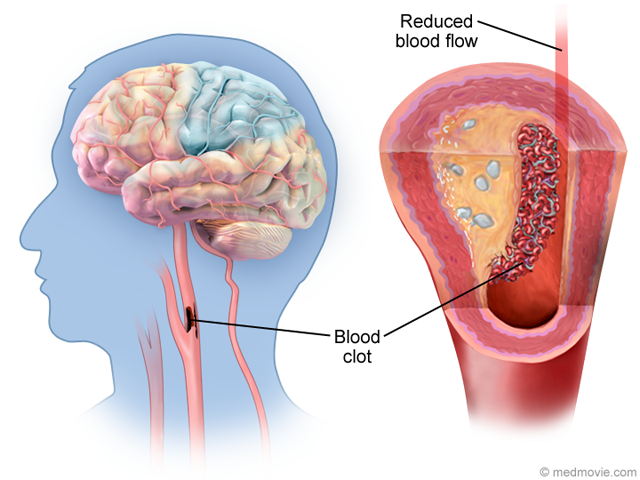 Ischemic StrokeA Ischemic Stroke is a sudden loss of function due to loss of blood supply to an area of the brain that controls that…
Ischemic StrokeA Ischemic Stroke is a sudden loss of function due to loss of blood supply to an area of the brain that controls that…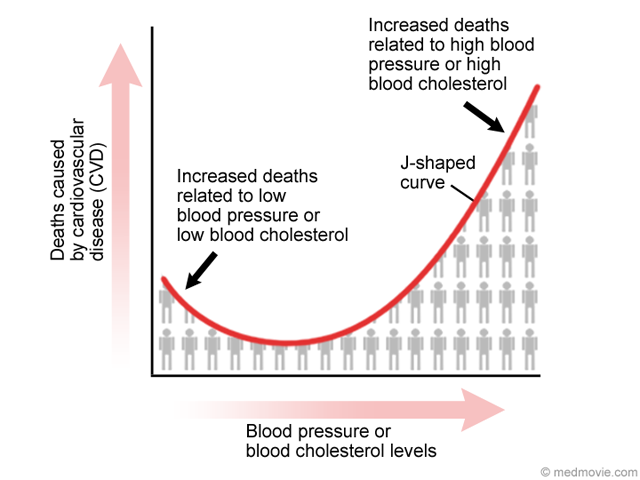 J Curve PhenomenonWhen the blood pressure or blood cholesterol levels of large groups of people are plotted on a graph against risk of…
J Curve PhenomenonWhen the blood pressure or blood cholesterol levels of large groups of people are plotted on a graph against risk of… Laser AngioplastyLaser Angioplasty (also known as excimer laser coronary angioplasty) is a technique that can be used to open coronary…
Laser AngioplastyLaser Angioplasty (also known as excimer laser coronary angioplasty) is a technique that can be used to open coronary… Long QT SyndromeLong QT Syndrome is a condition that affects the heart’s electrical system and may cause fast, chaotic heartbeats. It…
Long QT SyndromeLong QT Syndrome is a condition that affects the heart’s electrical system and may cause fast, chaotic heartbeats. It… Metabolic SyndromeMetabolic syndrome is a term for a group of metabolic risks factors that occur in one individual. About 35% of US…
Metabolic SyndromeMetabolic syndrome is a term for a group of metabolic risks factors that occur in one individual. About 35% of US…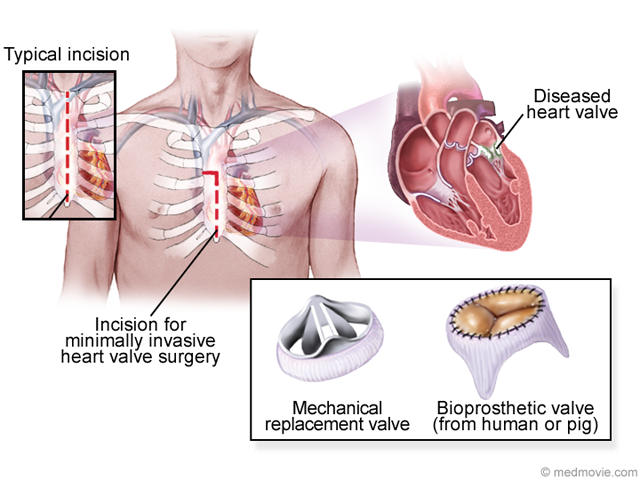 Minimally Invasive Valve SurgeryMinimally Invasive Heart Valve Surgery is used to replace poorly functioning heart valves using the smallest amount of…
Minimally Invasive Valve SurgeryMinimally Invasive Heart Valve Surgery is used to replace poorly functioning heart valves using the smallest amount of…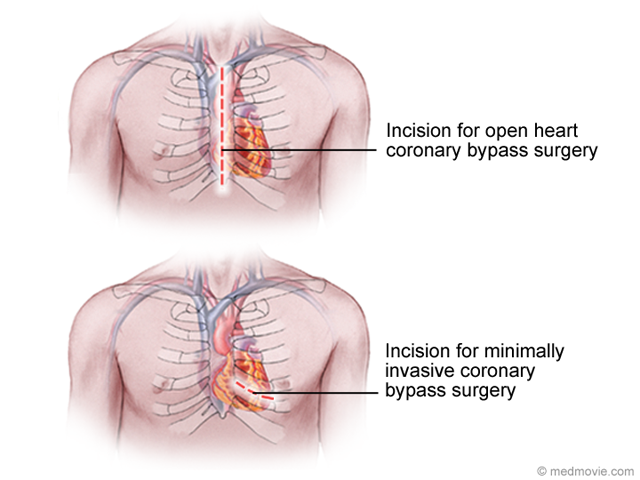 Minimally Invasive SurgeryMinimally Invasive Heart Surgery uses techniques that reduce the size of incisions (cuts) needed to access the heart…
Minimally Invasive SurgeryMinimally Invasive Heart Surgery uses techniques that reduce the size of incisions (cuts) needed to access the heart…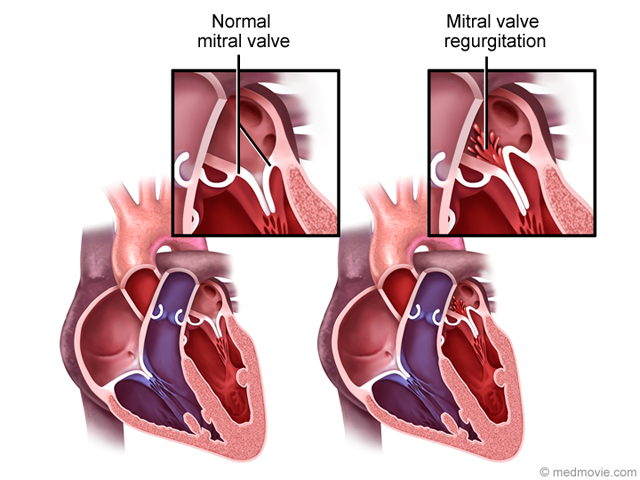 Mitral Valve RegurgitationThe valve on your heart’s left side between the upper and lower chambers (left atrium and ventricle) is the mitral…
Mitral Valve RegurgitationThe valve on your heart’s left side between the upper and lower chambers (left atrium and ventricle) is the mitral…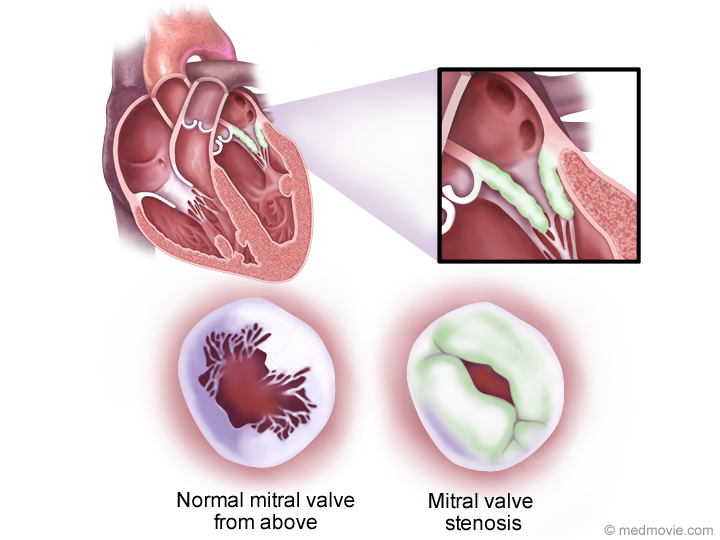 Mitral Valve StenosisThe valve on your heart’s left side between the upper and lower chambers (left atrium and ventricle) is the mitral…
Mitral Valve StenosisThe valve on your heart’s left side between the upper and lower chambers (left atrium and ventricle) is the mitral… MRI ScanMagnetic Resonance Imaging(MRI) uses a powerful magnetic field, radio waves, and a computer to create detailed…
MRI ScanMagnetic Resonance Imaging(MRI) uses a powerful magnetic field, radio waves, and a computer to create detailed… Myocardial BiopsyEndomyocardial Biopsy — In this test a small amount of tissue is removed from the internal lining of the heart for…
Myocardial BiopsyEndomyocardial Biopsy — In this test a small amount of tissue is removed from the internal lining of the heart for… Myocardial PerfusionMyocardial Perfusion Imaging (MPI) is a diagnostic procedure used to show how well your heart muscle is being supplied…
Myocardial PerfusionMyocardial Perfusion Imaging (MPI) is a diagnostic procedure used to show how well your heart muscle is being supplied…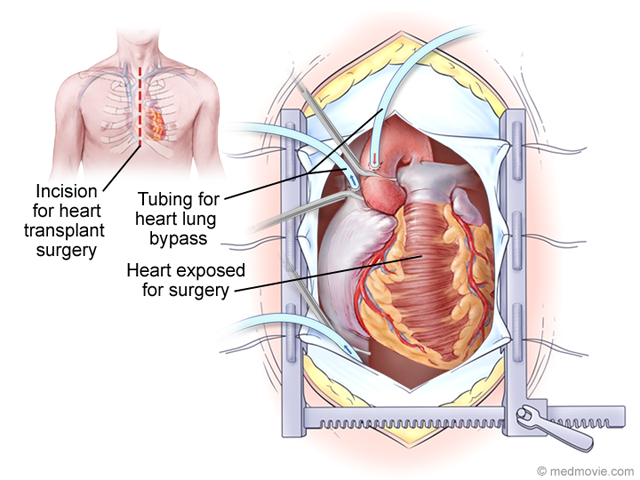 Open Heart SurgeryOpen-Heart Surgery is a surgical procedure that involves making a midline incision in the sternum (breast bone) to…
Open Heart SurgeryOpen-Heart Surgery is a surgical procedure that involves making a midline incision in the sternum (breast bone) to…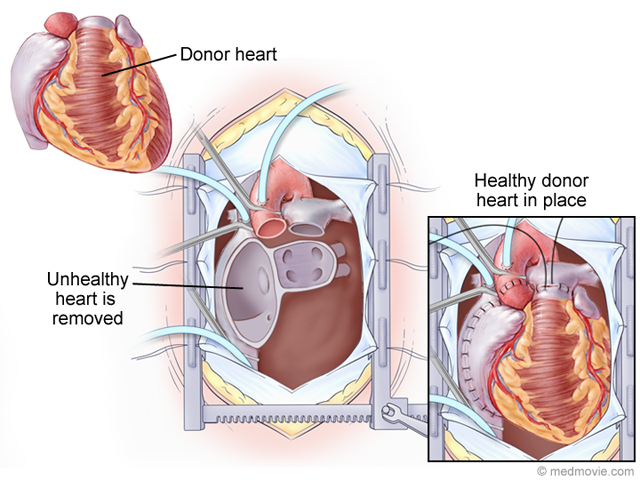 Organ DonationOrgan Donation supplies organs, such as hearts, to those in need of an organ transplant. A heart transplant is a…
Organ DonationOrgan Donation supplies organs, such as hearts, to those in need of an organ transplant. A heart transplant is a…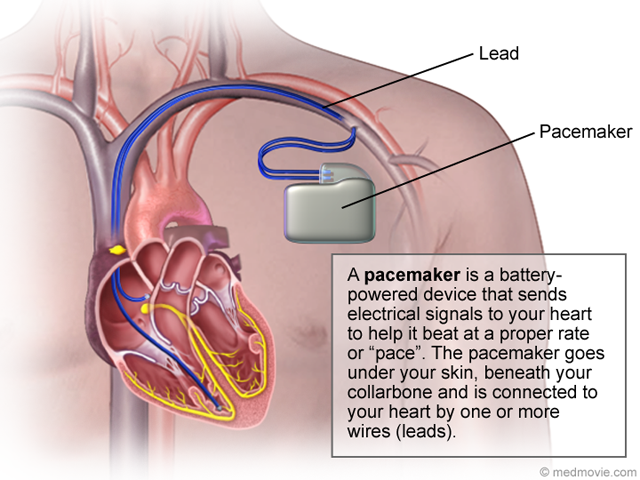 PacemakerA Pacemaker is a battery-powered device that sends electrical signals to your heart to help it beat at a proper rate or…
PacemakerA Pacemaker is a battery-powered device that sends electrical signals to your heart to help it beat at a proper rate or…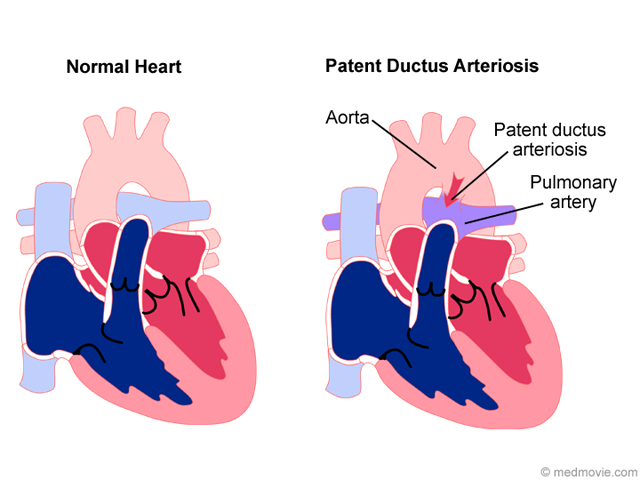 Patent Ductus ArteriosusThe Ductus Arteriosus is a passage that connects the aorta to the pulmonary artery. It is usually opens before birth…
Patent Ductus ArteriosusThe Ductus Arteriosus is a passage that connects the aorta to the pulmonary artery. It is usually opens before birth…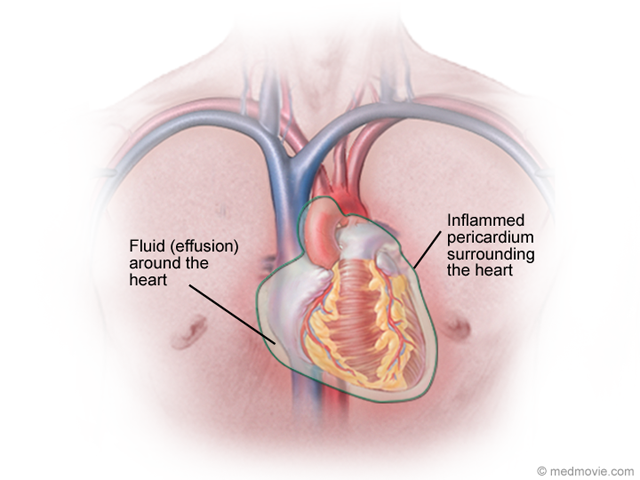 PericarditisPericarditis is inflammation of the pericardium. The pericardium is the thin sac (membrane) that surrounds the heart…
PericarditisPericarditis is inflammation of the pericardium. The pericardium is the thin sac (membrane) that surrounds the heart…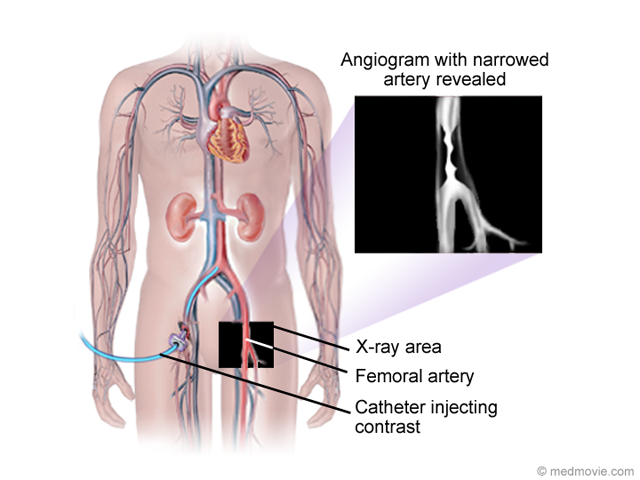 Peripheral AngiogramA Peripheral Angiogram is a test that uses X-rays to help your doctor find narrowed or blocked areas in one or more of…
Peripheral AngiogramA Peripheral Angiogram is a test that uses X-rays to help your doctor find narrowed or blocked areas in one or more of…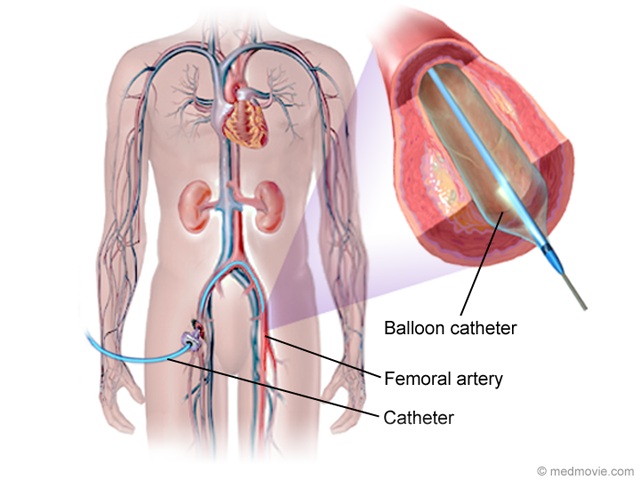 ahaw_0217iPeripheral Angioplasty is a procedure that opens up narrowed or blocked peripheral arteries (arteries not supplying the…
ahaw_0217iPeripheral Angioplasty is a procedure that opens up narrowed or blocked peripheral arteries (arteries not supplying the… Peripheral Artery DiseasePeripheral Artery Disease results from fatty deposits (plaque) that build up in the arteries outside the heart…
Peripheral Artery DiseasePeripheral Artery Disease results from fatty deposits (plaque) that build up in the arteries outside the heart…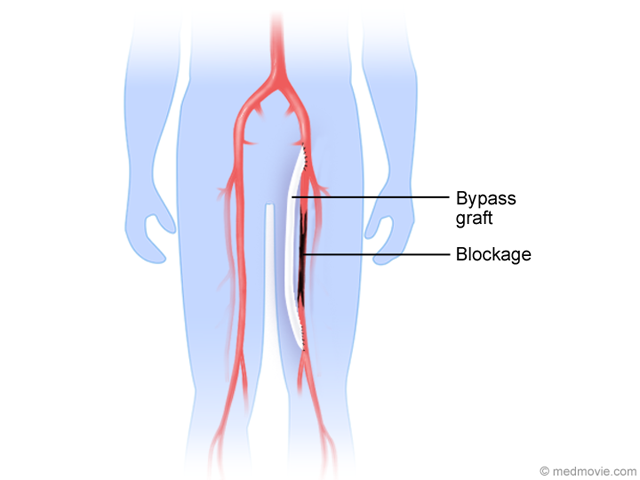 Peripheral Bypass SurgeryPeripheral Bypass Surgery is a procedure that uses a graft to reroute blood around a blockage in a peripheral artery.…
Peripheral Bypass SurgeryPeripheral Bypass Surgery is a procedure that uses a graft to reroute blood around a blockage in a peripheral artery.…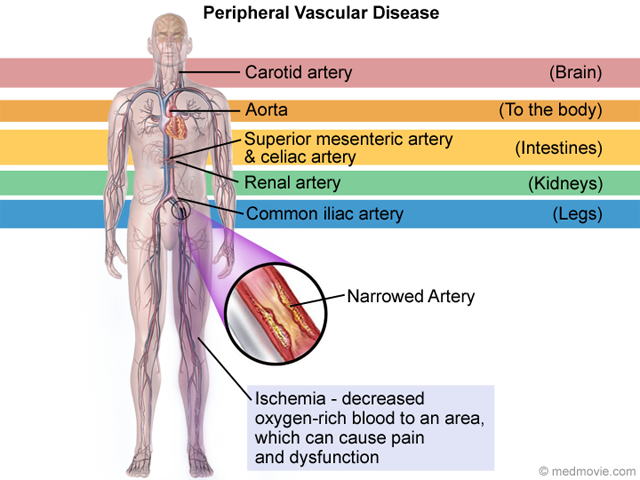 Peripheral Vascular DiseasePeripheral Vascular Diseaseresults from fatty deposits (plaque) that build up in the blood vessels outside the heart…
Peripheral Vascular DiseasePeripheral Vascular Diseaseresults from fatty deposits (plaque) that build up in the blood vessels outside the heart…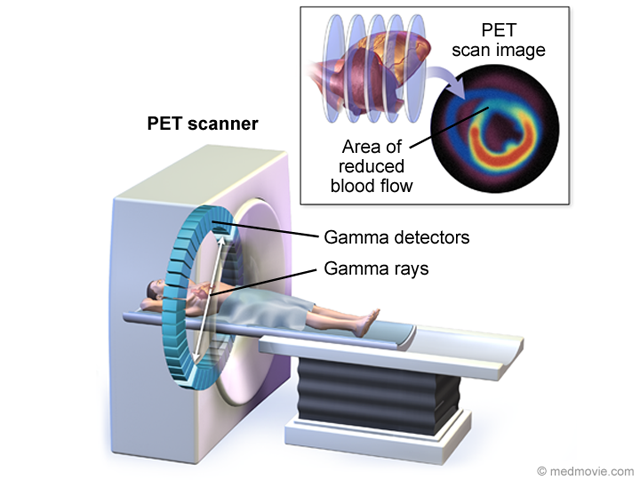 PET ScanA Positron Emission Tomography Scan (PET) is a noninvasive nuclear imaging test that uses radioactive tracers to…
PET ScanA Positron Emission Tomography Scan (PET) is a noninvasive nuclear imaging test that uses radioactive tracers to… Physical ActivityA sedentary lifestyle is one of the major risk factors for cardiovascular disease. A sedentary lifestyle is…
Physical ActivityA sedentary lifestyle is one of the major risk factors for cardiovascular disease. A sedentary lifestyle is…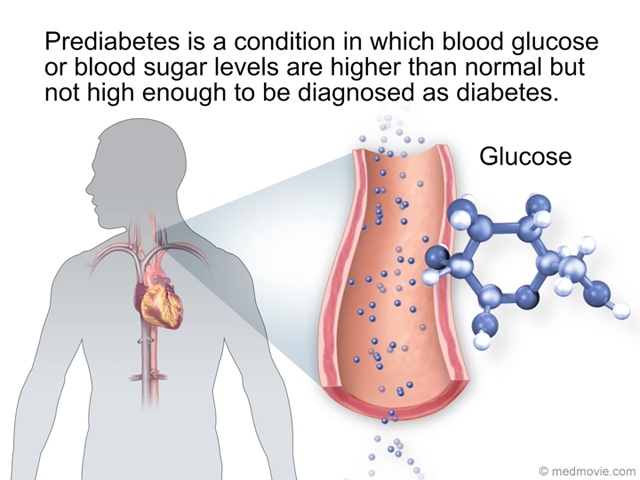 PrediabetesPrediabetes is a condition in which blood glucose (blood sugar) levels are higher than normal but not high enough to be…
PrediabetesPrediabetes is a condition in which blood glucose (blood sugar) levels are higher than normal but not high enough to be… Premature Ventricular ContractionsPremature Ventricular Contraction (PVC) is an abnormal heartbeat, or arrhythmia, in which the ventricle contracts early…
Premature Ventricular ContractionsPremature Ventricular Contraction (PVC) is an abnormal heartbeat, or arrhythmia, in which the ventricle contracts early…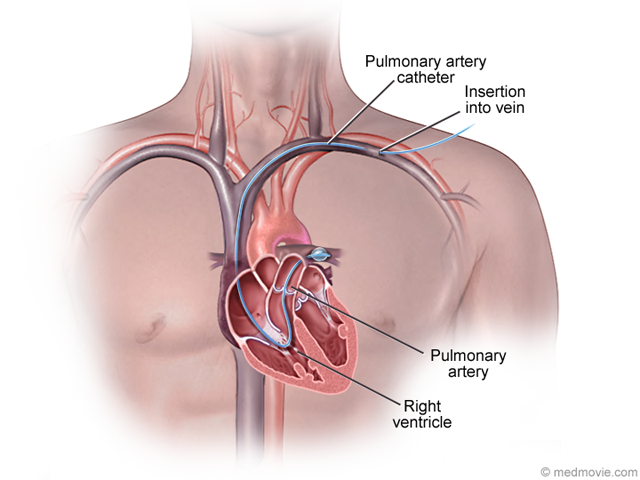 Pulmonary Artery CatheterPulmonary Artery Catheterization (Right Heart Catheterization or sometimes called Swan-Ganz Catheterization) is used to…
Pulmonary Artery CatheterPulmonary Artery Catheterization (Right Heart Catheterization or sometimes called Swan-Ganz Catheterization) is used to… Pulmonary EmbolismA Pulmonary Embolism is a sudden blockage of an artery in the lungs. It is caused by a blood clot (embolus) that…
Pulmonary EmbolismA Pulmonary Embolism is a sudden blockage of an artery in the lungs. It is caused by a blood clot (embolus) that…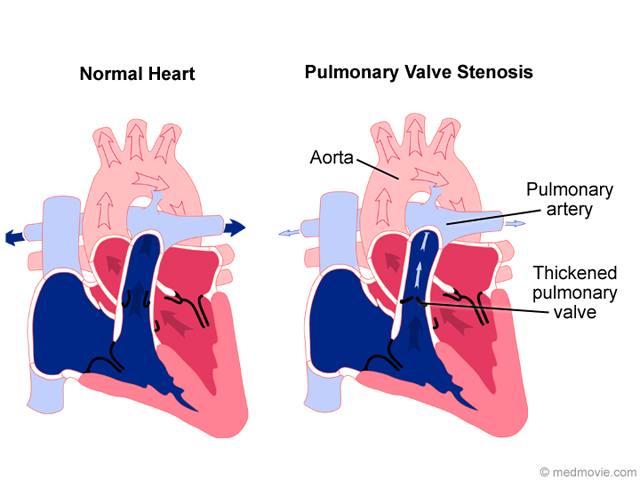 Pulmonary Valvular StenosisPulmonary Valve Stenosis is a condition in which the pulmonary valve is narrowed. The narrowing or stenosis is caused…
Pulmonary Valvular StenosisPulmonary Valve Stenosis is a condition in which the pulmonary valve is narrowed. The narrowing or stenosis is caused… Pulmonary VeinsThe Pulmonary Veins return oxygenated blood from the lungs to the left atrium of the heart. After blood enters the left…
Pulmonary VeinsThe Pulmonary Veins return oxygenated blood from the lungs to the left atrium of the heart. After blood enters the left… Radiofrequency AblationRadiofrequency Ablation is a procedure that corrects irregular heartbeats (arrhythmias) by destroying small amounts of…
Radiofrequency AblationRadiofrequency Ablation is a procedure that corrects irregular heartbeats (arrhythmias) by destroying small amounts of… Sinus RhythmA Sinus Rhythm is the pattern of electrical activity that is seen on an electrocardiogram (ECG or EKG) when the heart…
Sinus RhythmA Sinus Rhythm is the pattern of electrical activity that is seen on an electrocardiogram (ECG or EKG) when the heart… Smoking CessationSmoking cessation refers to quitting smoking. Quitting smoking is not easy, but there are things you can do to increase…
Smoking CessationSmoking cessation refers to quitting smoking. Quitting smoking is not easy, but there are things you can do to increase… Smoking Effects on the BodySmoking tobacco is the leading cause of preventable death in the United States. Smoking has been shown to have harmful…
Smoking Effects on the BodySmoking tobacco is the leading cause of preventable death in the United States. Smoking has been shown to have harmful… SPECT ScanA Single Photon Emission Computed Tomography Scan(SPECT) is a noninvasive nuclear imaging test. It uses radioactive…
SPECT ScanA Single Photon Emission Computed Tomography Scan(SPECT) is a noninvasive nuclear imaging test. It uses radioactive…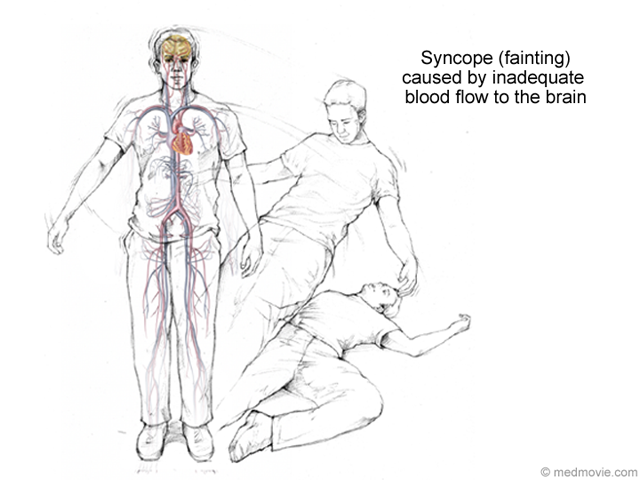 SyncopeSyncope is passing out, loss of consciousness or fainting caused by a temporary deficiency of oxygen in the brain.
SyncopeSyncope is passing out, loss of consciousness or fainting caused by a temporary deficiency of oxygen in the brain.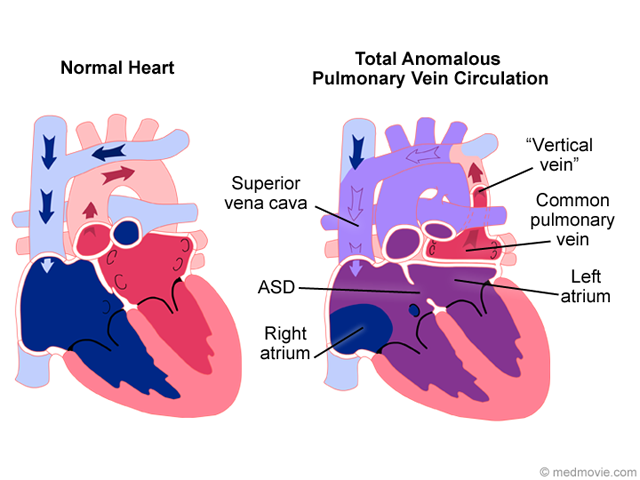 TAPVC - Supracardiac and InfracardiacTotal anomalous venous connections, or TAPVC, is a congenital malformation in which the pulmonary veins join to form a…
TAPVC - Supracardiac and InfracardiacTotal anomalous venous connections, or TAPVC, is a congenital malformation in which the pulmonary veins join to form a… Tetralogy of Fallotetralogy of Fallot is characterized by several malformations of the heart. These include: ventricular septal defect…
Tetralogy of Fallotetralogy of Fallot is characterized by several malformations of the heart. These include: ventricular septal defect…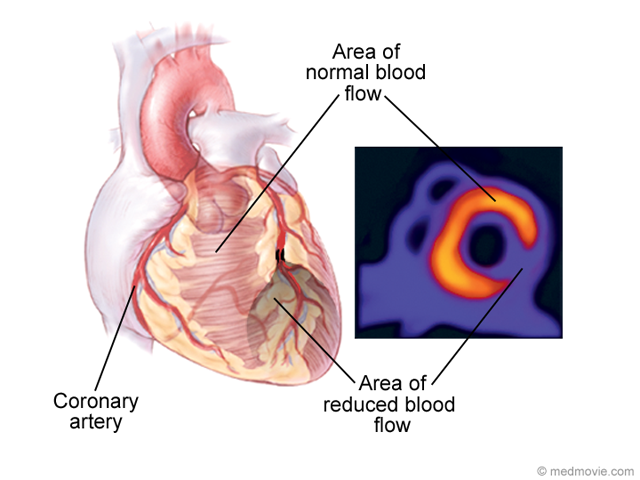 Thallium Stress TestThallium Stress Test is a type of nuclear scanning test or myocardial perfusion imaging test. Myocardial perfusion…
Thallium Stress TestThallium Stress Test is a type of nuclear scanning test or myocardial perfusion imaging test. Myocardial perfusion…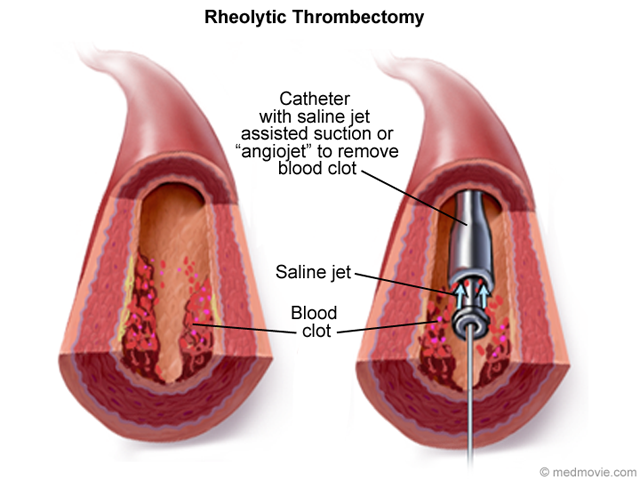 ThrombolysisThrombolysis is the breaking up of a blood clot. This can be achieved using certain “clot busting” drugs or by…
ThrombolysisThrombolysis is the breaking up of a blood clot. This can be achieved using certain “clot busting” drugs or by…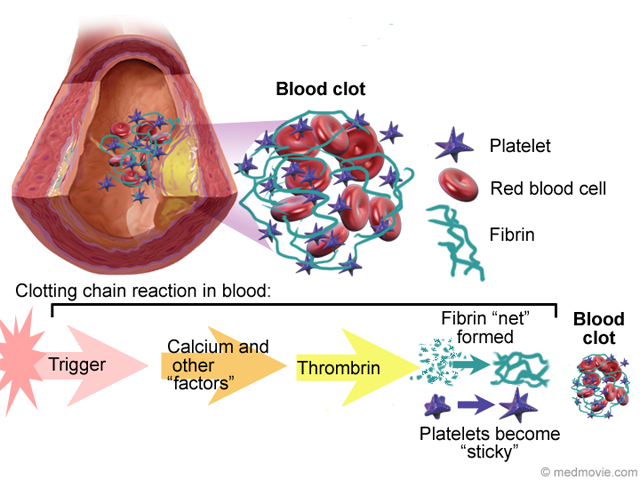 ThrombosisA blood clot is a normal reaction of the body that occurs if a blood vessel is injured. This is desirable if it occurs…
ThrombosisA blood clot is a normal reaction of the body that occurs if a blood vessel is injured. This is desirable if it occurs… Transesophageal EchocardiogramA Transesophageal Echocardiogram (also referred to as a TEE) is a diagnostic test used to view the structures of the…
Transesophageal EchocardiogramA Transesophageal Echocardiogram (also referred to as a TEE) is a diagnostic test used to view the structures of the… Transient Ischemic AttackA Transient Ischemic Attack(TIA) is a sudden loss of function due to a temporary blockage in a blood vessel that…
Transient Ischemic AttackA Transient Ischemic Attack(TIA) is a sudden loss of function due to a temporary blockage in a blood vessel that… Transmyocardial RevascularizationTransmyocardial Revascularization (TMR) is a procedure used to relieve severe angina or chest pain in very ill patients…
Transmyocardial RevascularizationTransmyocardial Revascularization (TMR) is a procedure used to relieve severe angina or chest pain in very ill patients…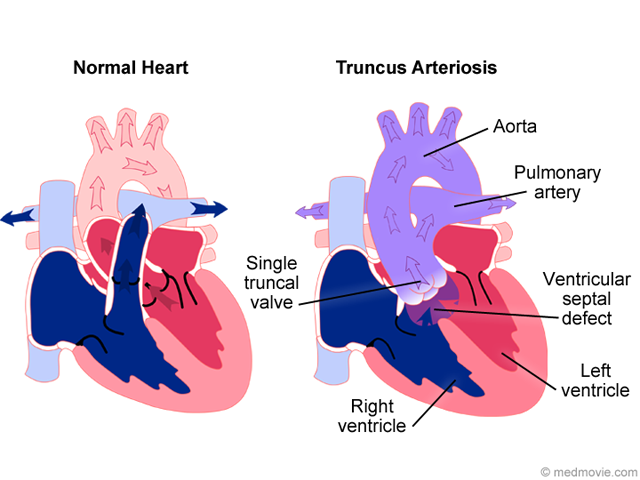 Truncus ArteriosusTruncus arteriosus is a congenital defect in which the two major arteries (the aorta and the pulmonary artery) fail to…
Truncus ArteriosusTruncus arteriosus is a congenital defect in which the two major arteries (the aorta and the pulmonary artery) fail to…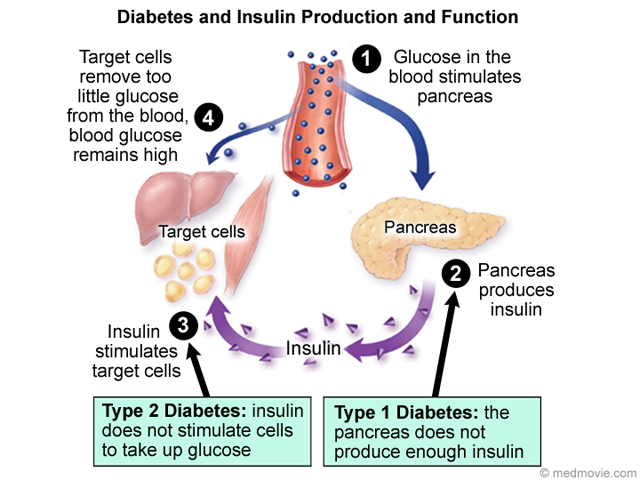 Types of DiabetesInsulin is a hormone produced in the pancreas, an organ near the stomach. Insulin helps the body use or store the blood…
Types of DiabetesInsulin is a hormone produced in the pancreas, an organ near the stomach. Insulin helps the body use or store the blood… Valves - 2 ViewsThe heart has four valves that regulate blood flow through the heart. The mitral valve and the tricuspid valve…
Valves - 2 ViewsThe heart has four valves that regulate blood flow through the heart. The mitral valve and the tricuspid valve… Ventricular Assist DeviceA Ventricular Assist Device (VAD) is a pumping device that is used to help a heart that can no longer pump blood…
Ventricular Assist DeviceA Ventricular Assist Device (VAD) is a pumping device that is used to help a heart that can no longer pump blood…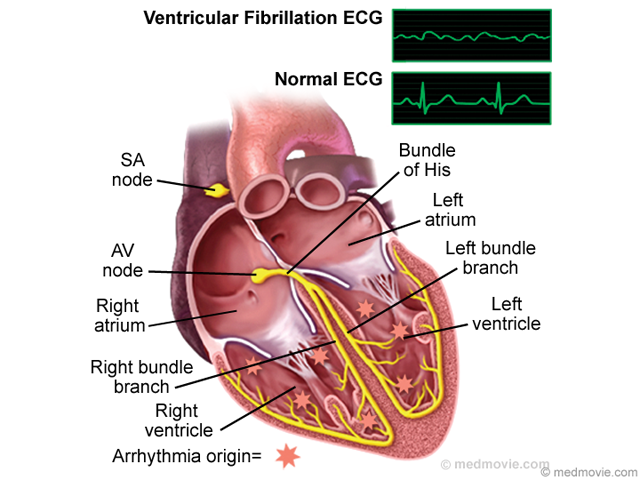 Ventricular FibrillationVentricular Fibrillation is a very fast, irregular heartbeat that is caused by abnormal firing of electrical signals in…
Ventricular FibrillationVentricular Fibrillation is a very fast, irregular heartbeat that is caused by abnormal firing of electrical signals in…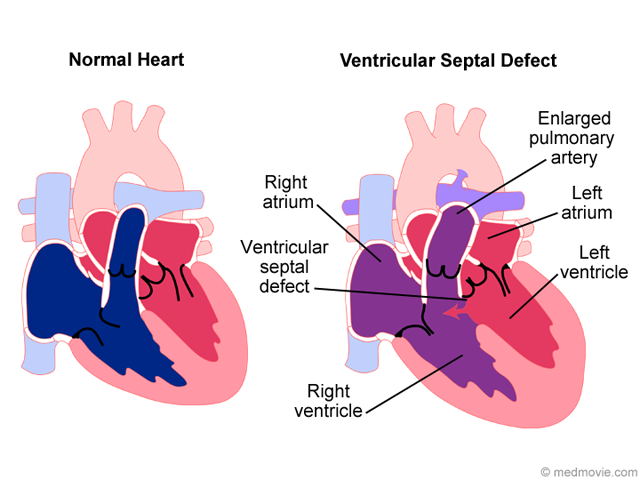 Ventricular Septal DefectVentricular septal defect, or VSD, is a hole in the septum that separates the right and left ventricles of the heart.…
Ventricular Septal DefectVentricular septal defect, or VSD, is a hole in the septum that separates the right and left ventricles of the heart.…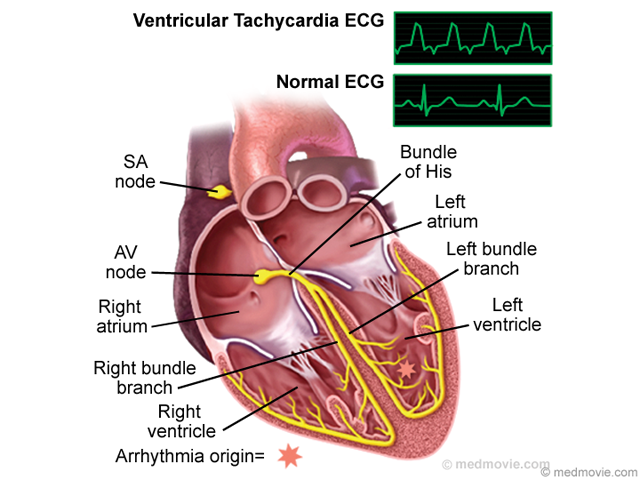 Ventricular TachycardiaVentricular Tachycardia is an abnormal heartbeat that is caused by an abnormal firing of electrical signals in the…
Ventricular TachycardiaVentricular Tachycardia is an abnormal heartbeat that is caused by an abnormal firing of electrical signals in the…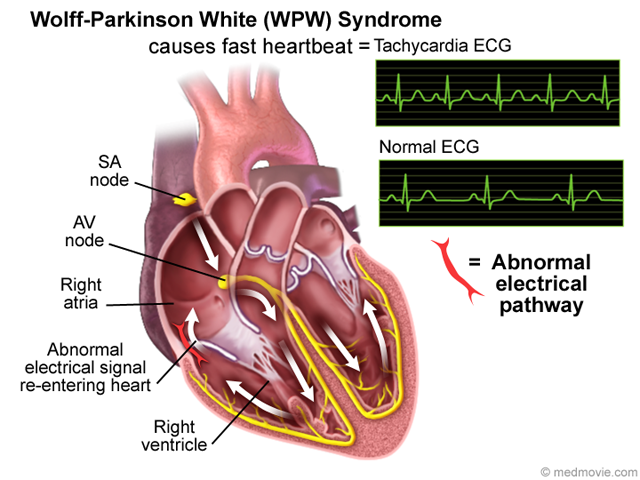 Wolff-Parkinson White SyndromeWolff-Parkinson White Syndrome (WPW) is a condition in which the heart beats too fast due to abnormal, extra electrical…
Wolff-Parkinson White SyndromeWolff-Parkinson White Syndrome (WPW) is a condition in which the heart beats too fast due to abnormal, extra electrical…